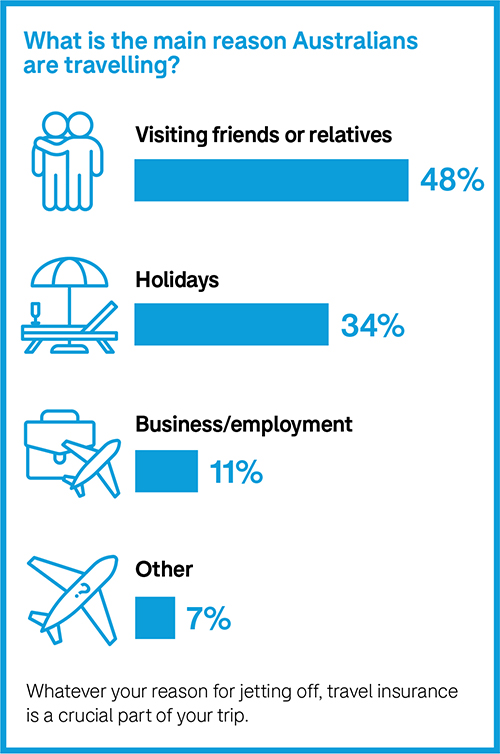The best travel insurance – 3,000 policies analysed (seriously…!)
It wasn't our idea of fun, but now your trip can be..
- Get an online quote in just a few minutes
- Free cover for dependent kids, under 21 travelling with you
- Optional add-on cover for your valuables

- Health members get 15% off
- Cheaper than average
- COVID cancellation

- Covers children up to age 25
- Kids travel for free
- COVID cover included

- Claim up to $5,000 for COVID cancellations
- Claim up to $50,000 for cancellation costs
- $7,500 rental car excess cover
In this guide

Compare quotes to find the best travel insurance for you
Get help finding the best travel insurance policies, why you can trust our research, great for value, great for covid cover, great for families, great for domestic travel, looking for the best travel insurance in australia, tips to find best travel insurance with covid cover, best travel insurance faqs.
Destinations
Add kids under the age of 1 by typing a “0” 0 traveller(s)
Include travel deals and helpful personal finance content from Finder
By submitting this form, you agree to our Privacy & Cookies Policy and Terms of Service
Did the CrowdStrike outage affect your holiday?
The global IT outage caused by CrowdStrike's glitch caused chaos at airports and ruined or delayed many people's travel plans.
We spoke to some of Australia's leading travel insurers to see what's covered and what's not. Read on to see what you may be able to claim for.

Our insurance specialists have gathered 300+ quotes for 50+ popular Australian travel insurance policies. We shortlisted 4 policies based on 2023 Finder Awards , customer reviews and expert analysis. Remember, there's no single best travel insurance policy that suits everyone's needs, since we all have different travel plans and needs.
Show summary
- Great for value: Southern Cross Travel Insurance
- Great for COVID cover: Medibank travel insurance
- Great for families: World2Cover
- Great for domestic travel: InsureandGo
Insurance plans analysed
PDS features analysed
Recent travelers surveyed
2.6 million
Quotes served since 2014
See how this score is calculated
Pros and cons
- It's affordable compared to other popular insurers including Cover-More and Allianz.
- Its PDS is much easier to understand compared to the other 28 other international policies we looked at.
- High customer ratings on Finder (4.16/5) and other popular review websites such as product review (4.7).
- Our awards data suggests Fast Cover and Medibank tend to be slightly cheaper.
- Customers rated Tick more highly in the Finder Customer Satisfaction Awards.
- $2,500 cap on cancellations is low and risky for expensive trips. For example, it's unlimited with Fast Cover.
How Southern Cross Travel Insurance compares
*Example quote based on a single 40-year-old travelling to Bali for 2 weeks. Comprehensive policies. Data collected in October 2023.
Why we picked it
SCTI has one of the best claims experiences and an easy-to-read PDS. It's not just us that thinks so. It earned a finalist spot for General Insurance Claims Team of the Year at The International Travel & Health Insurance Journal Awards and won the Best Plain English Legal Document at the most recent Plain Language Awards.
SCTI also received a mere 3 complaints to the Australian Financial Complaints Authority (AFCA) in the latest period. By comparison, Mitsui, which underwrites insurers including InsureandGo, received 47. Very large insurers such as Zurich and AWP (Allianz) received 325 and 95.
It's also consistently good value. On average, it's one of cheapest comprehensive travel insurers, according to our 2023 Finder Awards research. Out of 28 policies, only Fast Cover and Medibank were marginally cheaper.

The majority of comprehensive travel insurance policies cover COVID now but Medibank is a standout. Its $10,000 limit for COVID related trip cancellations is double the majority of insurers. Considering that 42% of Australians spend an average of $6,765 on holidays , Medibank is a safe choice. It also has a helpline that lets you chat to a doctor at any time.
- $10,000 cap for COVID cancellation costs and unlimited medical expenses.
- It's cheap – $233 less than average, according to 300+ quotes we gathered.
- 15% discount for health members (making it the cheapest out of 28 policies).
- ahm and Travel Insurance Saver also cover up to $10,000 for cancellations.
- Only Medibank and ahm health members can access discount.
- $15,000 cap for luggage. SCTI and Cover-More have a $25,000 cap.
How Medibank Travel Insurance compares
Out of 19 comprehensive travel insurance policies, Medibank was one of three to come with a $10,000 cap on COVID related cancellations. ahm and Travel Insurance Saver also cover COVID related cancellations. However, Medibank has a higher Finder Score.
Additionally, our research showed a Medibank international policy cost $353 on average for a 2-week trip overseas. That's $233 cheaper than average, according to our research of 28 policies. It's even cheaper if you're a Medibank or ahm member. It could knock $53 off a $353 policy.

World2Cover lets kids under 25 travel for free, so long as they're financially dependent on you. Most insurers including Cover-More and Southern Cross stop offering free cover when your children turn 20. It has a 9.4 Finder Score and out of the 50+ Product Disclosure Statements I looked at, it was one of the easiest to understand.
- Can cover kids up to the age of 25
- Up to $3,500 Covid cancellation cover per person – that's more than SCTI and Cover-More
- Unlimited cancellation cover
- Its underwriter received 43 complaints to AFCA – 21 more than Chubb and 40 more than SCTI (similar sized insurers)
- $5,000 rental car excess is lower than some e.g. Southern Cross ($10,000) and Allianz ($6,000)
How World2Cover Travel Insurance compares
*Example quote based on two 40-year-olds travelling to Bali for 2 weeks with 3 children aged 14, 12 and 7. Comprehensive policies selected. Data collected in October 2023.
Out of 20 travel insurers, World2Cover was one of the only brands to cover children up to the age of 25. It also doesn't have a limit on how many dependents can travel for free. Allianz can also cover kids on a family policy. However, it typically cost more in our research.
- It's very cheap. Out of 23 insurers, it's $180+ less than average.
- Get 10% off your travel insurance policy, using the code Finder10.
- Up to $7,500 towards car rental excess cover. That's $2,500 better than most.
- We found its PDS can be confusing and hard to understand.
- Cover-More, Fast Cover and SCTI also offer reasonably priced domestic policies.
- You absolutely need to read the PDS beforehand. There are lots of conditions attached to every benefit.
How InsureandGo Travel Insurance compares
*Example quote based on a single 40-year-old travelling in Australia for 1 week. All are domestic policies. Data collected in October 2023.
It's competitively-priced and won Finder's 2023 Best Domestic Travel Insurance Award. We looked at 23 domestic travel insurance policies as part of the awards and scored the same 14 features for every policy. These benefits included COVID rearrangement costs, theft or damage to luggage and rental car excess cover.
InsureandGo scored highly for a number of benefits including rental car excess cover, COVID cover, cancellation cover and luggage cover. You get up to $50,000 for cancellations, $25,000 for travel delays, $8,000 for lost luggage, $5,000 for COVID cancellation and rearrangement costs and $7,500 for rental car excess cover.
Similarly, it's good if you plan to rent a car while you're away. InsureandGo's top policy will cover the rental car excess for up to $7,500 if your car is damaged, stolen or involved in an accident. The average is $5,000. This sometimes isn't enough to cover the excess rental car companies charge.
It is also cheaper on average. Overall, it ranked in first place.
Top 5 policies in travel insurance – domestic
- InsureandGo Gold Domestic
- Australia Post Domestic Travel Insurance
- Cover-More Domestic Comprehensive Travel Insurance
- NRMA Domestic Comprehensive Travel Insurance
- Southern Cross Domestic Travel Insurance
Its main drawback is its Product Disclosure Statement which contains lots of conditions and could leave room for instances where you won't be covered. For example, it can cover cancelling your trip before departure but only for a specific number of reasons. These include: " your unforeseeable death, injury or illness; you have to go to court to be a witness or be on a jury (but not as an expert witness); there is an accident involving a vehicle you were planning to travel in, which happens within seven days before the date you planned to leave and means you cannot use the vehicle (This only applies to self-drive holidays). "
Keep in mind: there's no single best travel insurance policy that suits everyone, since we all have different travel plans and needs.
Over 2 million left Australian shores in December 2023, according to the Australian Bureau of Statistics . That's an annual increase of 500,000+ people.
To help you figure out what travel insurance company is the best in 2023, we asked over 1,200 Australians for their opinion and got our insurance experts to rate some of Australia's well-known brands.
Most travel insurers offer COVID cover now and most will cover you for similar COVID-related travel expenses . However, there are still some things you can do to make sure you're getting the right policy for you:
Take out cover for all travellers
Whether you're travelling with your partner or the whole family, make sure that you add them to the insurance policy. That way, if someone catches COVID but you don't, you'll still be covered for expenses.
Get a policy as soon as you book your trip
That way, you're covered if you get sick and need to cancel. A few insurers including Cover-More and Easy Travel Insurance also won't accept COVID-related claims within 21 days of your trip, so make sure you take out cover at least 3 weeks before you jet off.
Check the exclusions
It can be tedious but make sure you give the exclusions in the PDS a read before you buy. For example, you won't be covered for costs related to border closures. It means that you might be out of pocket for prepaid accommodation or booked airline tickets if the government of that country imposes a lockdown.

Jillian, Kerry and Tyson travelled from Sydney to Dallas. 10 days in, Tyson (Jillian's son) caught COVID, a day before the family was supposed to leave for a ski trip in Colorado. As a result, they had to rearrange their travel plans.
Unfortunately, Jillian got COVID later and the family had to send Tyson and Kerry home to Sydney, while Jillian stayed another 4 days until she tested negative. She then rebooked her trip home.
Their insurer, Southern Cross Travel Insurance , covered just under $3,000 in costs . The family paid a $500 excess to claim on 2 events.
Get a free travel insurance quote
Why you can trust Finder's travel insurance experts

What's the best type of travel insurance?
There are two main levels of travel insurance; basic and comprehensive. A basic travel insurance policy can cover you for health and medical emergencies. A comprehensive policy can cover your possessions too as well as other things like cancellation.
What's the best travel insurance with COVID cover?
Most policies will include some level of COVID cover so what's best can depend on how much you've spent on your trip. For example, many policies include COVID cover for up to $5,000. If your trip is costing you $9,000 then this might not be good enough for you. We've found higher limits with Medbank; here you're covered for up to $10,000 if your trip is cancelled due to COVID related reasons.
How far in advance should I buy travel insurance?
It's worth getting travel insurance as soon as you book your trip. That way, you're covered straight away. If something happens – say you get sick or your flight is cancelled or delayed – you're covered.
Is it best to get a single trip or annual policy?
Single trip policies may be best if you don't plan on travelling much over the next year or, if you're going on a long trip ( annual policies cap the length you're allowed to travel per trip – typically 30, 45 or 60 days).
Annual (or multi-trip) policies may be better if you're a jet-setter who intends to travel several times a year. Generally speaking, an annual policy may work out cheaper than paying for 4 single-trip policies in a year.
But be aware, annual plans have been a little harder to come by since the pandemic.
What's considered a pre-existing condition for travel insurance?
Essentially, a pre-existing condition is any medical condition you've been diagnosed with, in a specified time period, prior to taking out cover. Such conditions include heart problems, high blood pressure and diabetes.
What's the best travel insurance for Bali?
There have been several flight cancellations and delays to Bali recently. Most travel insurance polices can reimburse you for flight cancellations. However, it's worth going with an insurer that will also cover additional travel expenses such as accommodation and pre-booked excursions. It can be very frustrating if something happens but if the cancellation is due to circumstances out of your control, your insurer is likely to cover you.
What's the best travel insurance for the US?
The US has a notoriously expensive healthcare system so it's worth getting a travel insurance policy that comes with unlimited medical expenses cover at the very least. Fortunately, most comprehensive policies offer this. Other important medical-related expenses worth considering are:
- Hospital cash allowance. An amount you'll be given per day if you're hospitalised to pay for additional expenses.
- Resumption of journey. This can help pay you to get home if you're very sick.
Gary Ross Hunter
Gary Ross Hunter was an editor at Finder, specialising in insurance. He’s been writing about life, travel, home, car, pet and health insurance for over 6 years and regularly appears as an insurance expert in publications including The Sydney Morning Herald, The Guardian and news.com.au. Gary holds a Kaplan Tier 2 General Advice General Insurance certification which meets the requirements of ASIC Regulatory Guide 146 (RG146). See full bio
- Health, home, life, car, pet and travel insurance
- Managing the cost of living
More guides on Finder
Hitting the slopes? Avoid huge bills by getting ski travel insurance for your trip.
Check out these travel insurance coupons to save on your policy.
Find out how domestic car rental excess insurance could save you thousands.
Find travel insurance to enjoy Sri Lanka, and learn more about how you're protected overseas.
Knowing what you are covered for in a travel insurance policy is only half the story. Knowing when cover is not provided is equally important, and this guide shows why a thorough reading of your policy prior to purchase is highly recommended.
Why do volunteers need travel insurance? Who should provide it? What should it cover? This guide looks at volunteering in general and doing overseas volunteer work.
Finder examines an average travel insurance policy with useful tips on how to get value out of your policy.
Everything you need to know about travel insurance for your gadgets and electronics.
Keep yourself and your belongings safe on your European escape by comparing insurance polices today.
Whether your are travelling regularly for business or a senior travelling one time, compare policies from AIG Travel Insurance. Review AIG policy features and take out cover online.
Important information about this website
Advertiser disclosure.
finder.com.au is one of Australia's leading comparison websites. We are committed to our readers and stands by our editorial principles
We try to take an open and transparent approach and provide a broad-based comparison service. However, you should be aware that while we are an independently owned service, our comparison service does not include all providers or all products available in the market.
Some product issuers may provide products or offer services through multiple brands, associated companies or different labeling arrangements. This can make it difficult for consumers to compare alternatives or identify the companies behind the products. However, we aim to provide information to enable consumers to understand these issues.
How we make money
We make money by featuring products on our site. Compensation received from the providers featured on our site can influence which products we write about as well as where and how products appear on our page, but the order or placement of these products does not influence our assessment or opinions of them, nor is it an endorsement or recommendation for them.
Products marked as 'Top Pick', 'Promoted' or 'Advertisement' are prominently displayed either as a result of a commercial advertising arrangement or to highlight a particular product, provider or feature. Finder may receive remuneration from the Provider if you click on the related link, purchase or enquire about the product. Finder's decision to show a 'promoted' product is neither a recommendation that the product is appropriate for you nor an indication that the product is the best in its category. We encourage you to use the tools and information we provide to compare your options.
Where our site links to particular products or displays 'Go to site' buttons, we may receive a commission, referral fee or payment when you click on those buttons or apply for a product. You can learn more about how we make money .
Sorting and Ranking Products
When products are grouped in a table or list, the order in which they are initially sorted may be influenced by a range of factors including price, fees and discounts; commercial partnerships; product features; and brand popularity. We provide tools so you can sort and filter these lists to highlight features that matter to you.
Terms of Service and Privacy Policy
Please read our website terms of use and privacy policy for more information about our services and our approach to privacy.
We update our data regularly, but information can change between updates. Confirm details with the provider you're interested in before making a decision.
Learn how we maintain accuracy on our site.
U.S. News takes an unbiased approach to our recommendations. When you use our links to buy products, we may earn a commission but that in no way affects our editorial independence.
The Best Travel Insurance for Australia in 2024

Travelex Insurance Services »

Allianz Travel Insurance »

Generali Global Assistance »

World Nomads Travel Insurance »

GeoBlue »
Why Trust Us
U.S. News evaluates ratings, data and scores of more than 50 travel insurance companies from comparison websites like TravelInsurance.com, Squaremouth and InsureMyTrip, plus renowned credit rating agency AM Best, in addition to reviews and recommendations from top travel industry sources and consumers to determine the Best Travel Insurance for Australia.
Table of Contents
- Travelex Insurance Services
- Allianz Travel Insurance
Most travelers heading "Down Under" need to make quite the trek, and that's especially true for those planning a trip to Australia from the United States. Flying from Los Angeles to Sydney takes around 15 hours, and even more travel time is required to get to Melbourne and other destinations that require a layover on the way.
Plenty can go wrong en route to Australia as well as once you get there, and the potential for financial losses can be great if you're not careful. Not only can traveling long distances increase the risk of travel delays, but you also face the risk of flight cancellations, baggage delays, lost baggage and missed connections.
These are just some of the reasons why it makes sense to have a robust travel insurance plan in place before you fly overseas for a vacation in Australia. While any reputable travel insurance provider can provide you with protection for emergency medical expenses, your bags, travel delays and other various travel mishaps, we curated this list of top travel insurance plans for a trip to Australia specifically.
Frequently Asked Questions
Travel to Australia requires a huge commitment in terms of travel time and cost, which is why you'll want to make sure you have coverage that can reimburse you if something goes wrong. If your flight is delayed or canceled , your bags are lost in transit, or a missed connection leaves you stuck in another country for several days, having travel insurance means you can get reimbursement for unexpected hotel stays, meals you have to pay for and various incidental expenses.
Having travel insurance for Australia that includes medical coverage is also crucial since coverage provided in U.S. health plans will not apply.
Some travel credit cards offer coverage for trip cancellations or interruptions, travel delays, and lost or delayed baggage. However, credit cards are a poor source for coverage that protects against emergency medical expenses. Most credit cards do not offer coverage for emergency medical expenses or emergency medical evacuation at all, and those that do (such as the Chase Sapphire Reserve ) have insufficient coverage limits.
- Travelex Insurance Services: Best for Families
- Allianz Travel Insurance: Best for Flexible Cancellations
- Generali Global Assistance: Best for Medical Emergencies
- World Nomads Travel Insurance: Best for Adventure Travel
- GeoBlue: Best for Travel Health Insurance
Kids ages 17 and younger are covered automatically with Travel Select plan
Primary coverage with no deductibles
Lower limits for medical expenses than some providers
- 100% trip cancellation coverage worth up to $50,000
- 150% trip interruption coverage worth up to $75,000
- Trip delay coverage worth up to $2,000 for delays of five hours or longer ($200 daily limit applies)
- Missed connection coverage worth up to $750 for delays of three hours or longer
- Up to $50,000 in protection for emergency medical expenses (dental sublimit of $500)
- Up to $500,000 in coverage for emergency medical evacuation and repatriation of remains
- Up to $1,000 in coverage for baggage and personal effects
- Up to $200 in coverage for baggage delays of 12 hours or longer
- Up to $200 in coverage for sporting equipment delays of 24 hours or longer
- $25,000 in coverage for accidental death and dismemberment (AD&D)
SEE FULL REVIEW »
Optional CFAR coverage reimburses at 80%
Numerous plans to choose from
Lower coverage limits for medical expenses than some providers
- Up to $100,000 per traveler in coverage for trip cancellations
- Up to $150,000 per traveler in coverage for trip interruptions
- Up to $500 per traveler in Trip Change Protector coverage
- Up to $50,000 in emergency medical coverage per traveler
- Up to $500,000 for emergency medical transportation per traveler
- Up to $1,000 toward baggage loss or damage per traveler
- Up to $300 per traveler in coverage for baggage delays of 12 hours or more
- Up to $800 in protection for travel delays per traveler (daily limit of $200 applies)
- $100 per insured person per day in SmartBenefits coverage for eligible delays
- 24-hour hotline assistance
- Concierge services
Tailor medical coverage to your needs
Generous limits for emergency medical and medical evacuation coverage
Coverage for preexisting conditions only available with Premium plan
Optional CFAR coverage with Premium plan only reimburses at 60%
- Trip cancellation coverage up to 100% of the trip cost
- Trip interruption coverage up to 175% of the trip cost
- Travel delay coverage up to $1,000 per traveler ($300 daily limit)
- Up to $2,000 per person in baggage protection; $500 for delays
- Up to $2,000 per person in coverage for sporting equipment; $500 for delays
- Up to $1,000 per person in missed connection coverage
- Up to $250,000 per person in coverage for emergency medical and dental procedures
- Up to $1 million in coverage for emergency assistance and transportation ($10,000 limit for companion hospitality expenses)
- Up to $25,000 per person in rental car coverage
- Accidental death and dismemberment coverage
Coverage for more than 200 sports and activities
24-hour travel assistance services included
Low coverage limits within standard plans
No coverage for most preexisting conditions
- Up to $10,000 in coverage for trip cancellations
- Up to $100,000 in coverage for emergency medical expenses
- Up to $500,000 in protection for emergency medical evacuation
- Up to $3,000 in protection for damage or theft to your bags or gear
Offers travel health insurance for lengthy trips abroad
Deductibles can apply
Some plans require a primary U.S. health insurance plan
- Up to $1,000,000 medical maximum per insured person
- Up to $500,000 in coverage for emergency medical evacuation per trip
- Up to $50,000 in coverage for accidental death and dismemberment
- Up to $2,500 in coverage for emergency family travel arrangements
- Up to $25,000 in medical coverage for hazardous activities like skiing and diving
- Up to $500 per trip in lost baggage and personal effects coverage ($100 limit per bag)
- Up to $1,000 per trip period in post-departure trip interruption transportation
- Up to $50 per day in post-departure trip interruption quarantine coverage (in the case of COVID-19)
- Up to $25,000 in protection for repatriation of remains
Why Trust U.S. News Travel
Holly Johnson is an award-winning writer who has been covering topics like family travel, cruises, all-inclusive resorts and travel insurance for well over a decade. Johnson has researched and purchased travel insurance plans for her own trips, and she has successfully filed claims and received reimbursement more than once over the years. Currently, Johnson uses an annual travel insurance policy from Allianz to cover her family's many trips overseas each year. Johnson also works alongside her husband, Greg – who sells travel insurance for trips all over the world – in their family media business. Johnson also co-owns the travel agency Travel Blue Book .
You might also be interested in:

Travel Insurance for Europe: 4 Best Options for 2024
Holly Johnson
Learn about a range of coverage options for traveling abroad.

The Best Travel Insurance for Mexico in 2024
Find coverage options for medical emergencies, travel delays, lost baggage and more.

Expat Travel Insurance: The 5 Best Options for Globetrotters
Find the coverage and benefits you need for your adventures abroad.

Is Travel Insurance Worth It? Yes, in These 3 Scenarios
These are the scenarios when travel insurance makes most sense.
- Join CHOICE
Travel insurance
Tickets, money, passport, travel insurance!

For many people, buying travel insurance is like grabbing your toothbrush - a last-minute afterthought before rushing off to the airport. But preparing for a great holiday should also mean preparing for the holiday from hell... just in case. We show you how to pick the right level of insurance for your trip and how to understand the exclusions in the fine print. Plus, what you should know about the automatic cover offered by some credit cards.
Review and compare
Buying guides

Travel health
Got the wrong kind of travel bug? Here's how to stay healthy on holidays.

Insurance products
Looking for car, travel, health, home and contents, life or pet insurance? Here's the small print!

How to manage your money when you travel
Heading overseas? Avoid big fees and unfair exchange rates.
- Best Travel Insurance 2024
- Cheapest Travel Insurance
- Trip Cancellation Insurance
- Cancel for Any Reason Insurance
- Seniors' Travel Insurance
- Annual Travel Insurance
- Cruise Insurance
- COVID-19 Travel Insurance
- Travel Medical Insurance
- Medical Evacuation Insurance
- Pregnancy Travel Insurance
- Pre-existing Conditions Insurance
- Mexico Travel Insurance
- Italy Travel Insurance
- France Travel Insurance
- Spain Travel Insurance
- Canada Travel Insurance
- UK Travel Insurance
- Germany Travel Insurance
- Bahamas Travel Insurance
- Costa Rica Travel Insurance
- Disney Travel Insurance
- Schengen Travel Insurance
- Is travel insurance worth it?
- Average cost of travel insurance
- Is airline flight insurance worth it?
- Places to travel without a passport
- All travel insurance guides
- Best Pet Insurance 2024
- Cheap Pet Insurance
- Cat Insurance
- Dog Insurance
- Senior Dog Insurance
- Exotic Pet Insurance
- Pet Dental Insurance
- Pet Insurance That Pays Vets Directly
- Pet Insurance For Pre-Existing Conditions
- Pet Insurance with No Waiting Period
- Paw Protect Review
- Spot Pet Insurance Review
- Embrace Pet Insurance Review
- Healthy Paws Pet Insurance Review
- Pets Best Insurance Review
- Lemonade Pet Insurance Review
- Pumpkin Pet Insurance Review
- Fetch Pet Insurance Review
- Figo Pet Insurance Review
- CarePlus by Chewy Review
- MetLife Pet Insurance Review
- Average cost of pet insurance
- What does pet insurance cover?
- Is pet insurance worth it?
- Cat vaccinations cost
- Dog vaccinations cost
- Dog dental cleaning cost
- Dog cataract surgery cost
- All pet insurance guides
- Best Business Insurance 2024
- Business Owner Policy (BOP)
- General Liability Insurance
- E&O Professional Liability Insurance
- Workers' Compensation Insurance
- Commercial Property Insurance
- Cyber Liability Insurance
- Inland Marine Insurance
- Commercial Auto Insurance
- Product Liability Insurance
- Commercial Umbrella Insurance
- Fidelity Bond Insurance
- Business Personal Property Insurance
- Medical Malpractice insurance
- California Workers' Compensation Insurance
- Contractor's Insurance
- Home-Based Business Insurance
- Sole Proprietor's Insurance
- Handyman's Insurance
- Photographer's Insurance
- Esthetician's Insurance
- Salon Insurance
- Personal Trainer's Insurance
- Electrician's Insurance
- E-commerce Business Insurance
- Landscaper's Insurance
- Best Credit Cards of 2024
- Best Credit Card Sign-Up Bonuses
- Best Instant Approval Credit Cards
- Best Cash Back Credit Cards
- Best Rewards Credit Cards
- Best Credit Cards for Bad Credit
- Best Balance Transfer Credit Cards
- Best College Student Credit Cards
- Best 0% APR Credit Cards
- Best First Credit Cards
- Best No Annual Fee Cards
- Best Travel Credit Cards
- Best Hotel Credit Cards
- Best American Express Cards
- Best Amex Delta SkyMiles Cards
- Best American Express Business Cards
- Best Capital One Cards
- Best Capital One Business Cards
- Best Chase Cards
- Best Chase Business Cards
- Best Citi Credit Cards
- Best U.S. Bank Cards
- Best Discover Cards
- Amex Platinum Card Review
- Amex Gold Card Review
- Amex Blue Cash Preferred Review
- Amex Blue Cash Everyday Review
- Capital One Venture Card Review
- Capital One Venture X Card Review
- Capital One SavorOne Card Review
- Capital One Quicksilver Card Review
- Chase Sapphire Reserve Review
- Chase Sapphire Preferred Review
- United Explorer Review
- United Club Infinite Review
- Amex Gold vs. Platinum
- Amex Platinum vs. Chase Sapphire Reserve
- Capital One Venture vs. Venture X
- Capital One Venture X vs. Chase Sapphire Reserve
- Capital One SavorOne vs. Quicksilver
- Chase Sapphire Preferred vs. Capital One Venture
- Chase Sapphire Preferred vs. Amex Gold
- Delta Reserve vs. Amex Platinum
- Chase Sapphire Preferred vs. Reserve
- How to Get Amex Pre-Approval
- Amex Travel Insurance Explained
- Chase Sapphire Travel Insurance Guide
- Chase Pay Yourself Back
- CLEAR vs. TSA PreCheck
- Global Entry vs. TSA Precheck
- Costco Payment Methods
- Chase Ultimate Rewards Guide
- Capital One Rewards Guide
- Amex Membership Rewards Guide
- All Credit Card Guides
- Raisin (SaveBetter) Interest Rates
- Citibank Savings Account Interest Rate
- Capital One Savings Account Interest Rate
- American Express Savings Account Interest Rate
- Western Alliance Savings Account Interest Rate
- Barclays Savings Account Interest Rate
- Discover Savings Account Interest Rate
- Chase Savings Account Interest Rate
- U.S. Bank Savings Account Interest Rate
- Marcus Savings Account Interest Rate
- Synchrony Bank Savings Account Interest Rate
- Ally Savings Account Interest Rate
- Bank of America Savings Account Interest Rate
- Wells Fargo Savings Account Interest Rates
- SoFi Savings Account Interest Rate
- UFB Direct Savings Account Interest Rate
- Best Savings Accounts & Interest Rates
- Best High Yield Savings Accounts
- Best 7% Interest Savings Accounts
- Best 5% Interest Savings Accounts
- Savings Interest Calculator
- Emergency Fund Calculator
- How much will $1,000 earn in a HYSA?
- How much will $10,000 make in a HYSA?
- Pros and Cons of High-Yield Savings Accounts
- Types of Savings Accounts
- Is Savings Account Interest Taxable?
- Checking vs Savings Accounts
- Average Savings by Age
- How Much Should I Have in Savings?
- How to Save Money
- Compare Best Checking Accounts
- Compare Online Checking Accounts
- Best Business Checking Accounts
- Compare Best Teen Checking Accounts
- Best Student Checking Accounts
- Best Joint Checking Accounts
- Best Second Chance Checking Accounts
- Chase Checking Account Review
- Bluevine Business Checking Review
- Amex Rewards Checking Account Review
- Best Money Market Accounts
- U.S. Bank Money Market Account
- Money Market vs. Savings Account
- How much will $10,000 make in a MMA?
- Best CD Rates
- Best 1-Year CD Rates
- Best 6-Month CD Rates
- Best 3-Month CD Rates
- 6% CD Rates
- How much will a $10,000 CD earn?
- How much will a $50,000 CD earn?
- Synchrony Bank CD Rates
- Capital One CD Rates
- Barclays CD Rates
- How To Get A Loan
- Loan Interest Calculator
- How To Prequalify for a Personal Loan
- What is a Payday Loan?
- How To Get a Loan With No Credit History
- Financial Hardship Loans
- Low-Income Personal Loans
- No Credit Check Loans
- Why Can't I Get a Loan?
- Cash Advance Apps
- All Insurance Guides
- Australia Travel Insurance
On This Page
- Key takeaways
Do I need travel insurance to visit Australia?
Best travel coverage for visiting australia, what does travel insurance for australia cover, what isn’t covered by travel insurance for australia, how much does travel insurance for australia cost, tips for getting the best australia travel insurance, australia travel information & requirements, australia travel insurance faqs, related topics.
Australia Travel Insurance: Trip Info & Quotes for U.S. Visitors
- To travel to Australia, you must have a valid U.S. passport , but you don’t need a visa.
- The Australian government doesn’t require American tourists to purchase travel insurance, but it’s wise to have at least medical and medical evacuation coverage since your U.S. health insurance won’t work in Australia .
- In addition to medical emergencies, travel insurance can also cover things like trip cancellations, trip interruptions and rental car damage .
- According to our research, our top picks for travel insurance for Australia come from Travel Insured, Travelex and Faye ( skip ahead to view these plans ).
- We recommend using an online comparison tool to find the best travel insurance policy to suit your needs.
Our top picks for the best australia travel insurance
- Travel Insured International: Best for Robust Coverage
- Travelex Insurance Services: Best for Basic Medical Coverage
- Faye Travel Insurance: Best for Digital Claims Process & App
Our top picks for travel insurance for Australia
Travel insured international, travelex insurance services, faye travel insurance.
Australia doesn’t require U.S. tourists to buy travel insurance, but we highly recommend purchasing a comprehensive policy before your trip commences.
Below are some risks you may encounter that would make purchasing travel insurance worthwhile .
Risks with adventure activities
Australia is one of the best places to visit if you love parasailing, paragliding, hot air ballooning, diving and other adventure activities. Unfortunately, these activities are risky, so there’s a chance that you’ll break a bone or sustain some other type of injury.
Travel insurance covers medical expenses and other costs associated with these injuries, ensuring you don’t end up with a huge hospital bill. This type of insurance is especially helpful if you plan to explore the Great Barrier Reef, take an excursion into the Outback or swim near the shoreline of one of Australia’s beautiful beaches.
Risks due to wildlife
Australia is full of dangerous critters, from venomous spiders and snakes to aggressive kangaroos. Depending on where you visit, you may end up encountering an unfriendly Tasmanian devil. U.S. medical insurance typically doesn’t work in Australia, so it’s important to have travel insurance for these unexpected situations. If you’re bitten by a Tasmanian devil or sustain some other wildlife-related injury, travel insurance takes the place of your regular medical insurance.
Risks due to bushfires
Bushfires have a high heat output and can cause a significant amount of damage in a short amount of time. If you find yourself in Australia during one of these fires, you may have to contend with damage to your rental car or your personal belongings. Comprehensive travel insurance may reimburse you for damaged or destroyed items, or it may reimburse your rental car agency for the cost of repairing or replacing a damaged vehicle.
Risks related to long-distance driving
Australia has many isolated regions that are hundreds of miles from the nearest populated area. You may have to drive several hundred miles to reach your destination, so it’s important to have travel insurance before you set off on an adventure.
Best for Robust Coverage
Why we like it.
- Travel delay coverage kicks in after just six hours
- Generous $150,000 non-medical evacuation coverage
- 24/7 emergency travel assistance included
- CFAR and IFAR coverage not included
- Baggage delay coverage only kicks in after 12 hours
- No rental car coverage
Best for Basic Medical Coverage
- Plans can be customized with upgrades
- Children 17 and under included for free with some plans
- Coverage for pre-existing medical conditions available
- CFAR coverage is available as an add-on to a comprehensive travel insurance plan
- Optional CFAR coverage only reimburses 50% of prepaid travel expenses, which is less than some competitors
- Travel Select plan only has $50,000 in coverage for emergency medical expenses, which is lower than some competitors
- The baggage delay benefit requires a 12-hour waiting period
- CFAR coverage is not available with all Travelex plans
Best for Digital Claims Process & App
Editor's take
Faye is a new travel insurance disruptor that offers an innovative solution to travel insurance with a digital-first approach. What sets them apart is their user-friendly solution to a traditionally bureaucratic system. With Faye, users can manage everything online or via the Faye app – including the entire booking and claims process. Although it’s a newer provider in the travel insurance industry, Faye is already rising as a fan favorite among young, tech-savvy travelers and digital nomads who want quick, convenient, and reliable travel insurance without having to go through an agent.
Apart from their online-first approach, Faye is easy to use and caters to all types of travelers including those who may want help via phone support.
Another feature that sets Faye apart from the competition is their plan offerings. Faye offers one base plan with an array of comprehensive coverage and optional add-ons to customize your plan.
Potential Add-ons include:
- Rental car care
- Cancel for any reason
- Vacation rental damage
- Adventure & extreme sports
If you are looking for a convenient and cost-effective way to insure your vacation, consider opting for Faye travel insurance. *Note: Coverage limits and availability may vary by state of residence.
Read our full review
- Friendly agents
- Easy-to-use mobile app
- Fast reimbursements for eligible claims
- Prompt replies to questions
- Long wait times for reimbursement
- Difficulty reaching Faye outside of email & virtual chat
Travel insurance can cover a wide range of circumstances, but each plan has different inclusions and exclusions. Here is a look at the most important types of travel insurance coverage to consider getting when visiting Australia.
Trip cancellation insurance
Australia is far away and is a developed nation on par with the United States. That means trips to Australia are usually quite expensive. It’s never fun to cancel a vacation you’ve been looking forward to for months, but it’s even worse when a cancellation results in significant financial losses.
Trip cancellation insurance protects you if you have to cancel your trip to Australia for a reason stipulated in the policy. For example, if one of your travel companions is diagnosed with a serious illness before your departure date, you can use your insurance to recoup pre-paid, nonrefundable trip expenses.
If you want to have coverage for any type of circumstance, you can also purchase cancel for any reason (CFAR) insurance . Typically sold as an add-on, this type of coverage will reimburse you for around 50% to 70% of your total prepaid costs .
Trip delay insurance
To get to Australia, you may have to rely on the services of multiple common carriers. For example, you may have to fly to Australia and then take a ferry to your final destination. Trip delay insurance reimburses you for any expenses you incur as the result of a common carrier delay. If your flight is canceled, for example, your insurer may reimburse you for meals, a hotel, additional transportation costs, and other related expenses.
Trip interruption insurance
Imagine that you arrive in Australia, enjoy a few days of fun and then come down with a severe illness. You’re so sick that you have to return to the United States sooner than expected. Trip interruption insurance reimburses your pre-paid, nonrefundable expenses in this type of scenario. It should also cover the cost of adjusting your travel plans or accessing emergency assistance services.
Travel medical insurance
As noted previously, it’s unlikely you will be be able to use your U.S. health insurance in Australia . Therefore, it’s important to have travel medical insurance to cover things like urgent care, hospitalization, blood tests, CT scans and other healthcare services. If you’re injured while snorkeling or suddenly develop appendicitis during your trip, you can rest easy knowing that your medical expenses are covered.
Medical evacuation insurance
If you’re injured in the Outback, you can’t exactly hop in a cab and get to a hospital within a few minutes. Medical evacuation insurance covers the cost of transporting you to a healthcare facility that’s capable of meeting your needs. For example, if you need emergency assistance, your policy may cover the cost of air medical services (like helicopter transportation).
Insurance for personal items
We recommend that you leave your valuables at home, but if you just have to take jewelry, designer clothing or expensive sports equipment on your trip, make sure your travel insurance includes coverage for lost, stolen and damaged items. This type of coverage reimburses you if a common carrier loses or damages your luggage or its contents.
Rental car coverage
Rental car coverage can protect you under the following circumstances:
- You’re involved in an auto accident caused by someone else.
- Someone vandalizes your rental vehicle.
- Someone steals your rental vehicle.
If your policy includes this type of coverage, your insurer will reimburse the rental agency any time you experience a covered loss. For example, if you get into a fender-bender in one of Sydney’s famous traffic jams, your insurance company should reimburse the rental agency for the cost of repairs.
Travel insurance for Australia doesn’t cover the following:
- Pre-existing conditions: If you’re diagnosed with a medical condition like asthma or diabetes before you buy your travel insurance, your insurer won’t pay for medical expenses associated with that diagnosis. In some cases, however, you can opt for a plan with a waiver. This can ensure coverage for pre-existing conditions during your trip.
- Illegal activities: Travel insurance doesn’t cover expenses arising from any illegal activities, such as injuries that occur while under the influence of illicit substances.
- Fear of travel: If you book a trip and then suddenly develop a fear of flying, your insurance company won’t reimburse you for your pre-paid expenses. The same applies to a fear of seeing a spider or encountering a Tasmanian devil during your trip.
- Expected events: Travel insurance doesn’t cover expenses associated with events that you knew about (or should have known about) before a trip. For example, if you book a trip and buy insurance after a named storm has started developing, your insurer won’t reimburse you if the storm forces you to cancel or interrupt your trip.
For a trip to Australia, we found that the cost of travel insurance ranges from less than $1 per day to around $11 per day depending on the type of coverage.
To give you a better idea, we requested multiple quotes from leading travel insurance providers.
These quotes are based on the following criteria:
- Age: 35 years old
- Destination: Australia
- Trip Length: 7 days
- Trip cost: $2,000
You can see our quotes for basic travel insurance in the following table. The cheapest travel insurance plan costs just under $1 per day .
Example Where Plan Doesn’t Reimburse the Full Trip Cost
The plans in this next table are more comprehensive. In addition to medical and medical evacuation coverage, they also include trip cancellation and trip interruption coverage. According to our quotes, these plans cost between $7 and $11 per day .
Example Where Plan Does Reimburse the Full Trip Cost
Your costs won’t be exactly the same, as insurance companies base their premiums on these factors:
- Trip cost: Insurance companies reimburse you for up to 100% of your prepaid, nonrefundable expenses. The more your trip costs, the more your insurance provider has to pay you if you experience a covered loss. Therefore, the cost of your insurance plan depends on the cost of your trip.
- Age: Older people are more likely to develop serious medical problems while traveling, so it costs more to insure a 60-year-old or 70-year-old traveler than it does to insure someone in their 20s.
- Insurance benefits: Some travel insurance plans come with more benefits than others. For example, a plan that offers $1 million in medical evacuation coverage will cost more than a plan that comes with only $100,000 in medical evacuation coverage.
- Destination: Some destinations are riskier than others, so insurance companies charge different rates based on your itinerary.
- Add-on coverage: You may need to purchase add-on coverage, such as insurance for adventure activities. If so, you’ll pay an additional premium for the extra benefits.
To find the best travel insurance for your needs, follow these tips:
Consider how you’re getting to and around Australia.
You’ll have to take an airplane from the United States to Australia, but depending on your plans, you may also need to ride a train or take a ferry at some point. The more carriers you use, the more likely you are to experience delays and other problems, increasing the amount of coverage needed.
Think carefully about what you plan to do.
If you want to visit the Sydney Opera House and check out the Australian Museum, you won’t need as much coverage as someone who plans to camp in the Outback or go parasailing over the Gold Coast. You may also want to limit your cancellation costs by purchasing cancel-for-any-reason coverage.
Time your purchase carefully.
Although you can buy Overseas Visitors Cover when you arrive, it’s typically cheaper to purchase travel insurance well in advance of your trip.
Are there COVID-19 restrictions for U.S. tourists?
No. Australia has no COVID-19-related restrictions for American travelers. However, the Australian government does recommend getting the COVID-19 vaccine, wearing masks and practicing good hygiene.
Do I need a visa or passport to travel to Australia?
Yes. You need a valid U.S. passport with at least one blank page for your entry stamp.
Is it safe to visit Australia?
The United States and Australia have a strong diplomatic relationship. Although there’s always some level of risk involved in traveling to a foreign country, Australia is generally safe for Americans. The U.S. Department of State has issued a Level 1 travel advisory , indicating that you don’t need to take any special safety precautions when visiting the “Land Down Under.”
What travel insurance do I need to travel to Australia?
You’re not required to purchase travel insurance for Australia, but we highly recommend that you do. You never know when you’re going to have an emergency or encounter some kind of problem during a trip. To find the right policy to suit your needs, try using an online comparison tool .
Does American health insurance work in Australia?
In most cases, no. Medicare and Medicaid only work in the United States, and most private health insurance companies will only cover expenses if you use U.S. medical facilities.
Can foreigners buy travel insurance in Australia?
When you travel to Australia, you have the option of buying Overseas Visitors Cover. However, not many companies provide this type of coverage. There may also be waiting periods for medical coverage. Therefore, we recommend that you buy travel insurance before you leave the United States.
About the Author

Leigh Morgan is a seasoned personal finance contributor with over 15 years of experience writing on a diverse range of professional legal and financial topics. She specializes in subjects like navigating the complexities of insurance, savings, zero-based budgeting and emergency fund development.
In the last five years, she’s authored over 300 articles for credit unions, digital banks, and financial professionals. Morgan is also the author of “77 Tips for Preventing Elder Financial Abuse,” a book focused on helping caregivers protect the elderly from financial scams.
In addition to her writing skills, she brings real-world financial acumen thanks to her previous experience managing rental properties as part of a $34 million real estate portfolio.
Explore related articles by topic
- All Travel Insurance Articles
- Learn the Basics
- Health & Medical
- Insurance Provider Reviews
- Insurance by Destination
- Trip Planning & Ideas

Best Travel Insurance Companies & Plans in 2024
Best Travel Insurance for Seniors

Best Medical Evacuation Insurance Plans 2024

Best Cruise Insurance Plans for 2024

Best COVID-19 Travel Insurance Plans for 2024

Best Cheap Travel Insurance Companies - Top Plans 2024

Best Cancel for Any Reason (CFAR) Travel Insurance

Best Annual Travel Insurance: Multi-Trip Coverage

Best Travel Medical Insurance - Top Plans & Providers 2024

- Is Travel Insurance Worth It?

Is Flight Insurance Worth It? | Airlines' Limited Coverage Explained

Pregnancy Travel Insurance: Tips for Traveling while Pregnant

10 Romantic Anniversary Getaway Ideas for 2023

Best Travel Insurance for Pre-Existing Medical Conditions August 2024

22 Places to Travel Without a Passport in 2024

Costa Rica Travel Insurance: Requirements, Tips & Safety Info

Best Spain Travel Insurance: Top Plans & Cost

Best Italy Travel Insurance: Plans, Cost, & Tips

Best Travel Insurance for your Vacation to Disney World

Guide to Chase Sapphire Travel Insurance Benefits 2024

2024 Complete Guide to American Express Travel Insurance
Schengen Travel Insurance: Coverage for your Schengen Visa Application

Mexico Travel Insurance: Top Plans in 2024

Best Places to Spend Christmas in Mexico this December

Travel Insurance to Canada: Plans for US Visitors
Best Travel Insurance for France Vacations in 2024
Travel Insurance for Germany: Top Plans 2024

Best UK Travel Insurance: Coverage Tips & Plans August 2024

Best Travel Insurance for Trips to the Bahamas

Europe Travel Insurance: Your Essential Coverage Guide

Trip Cancellation Insurance: Plans & Coverage Explained

What Countries Require Travel Insurance for Entry?

Philippines Travel Insurance: Coverage Requirements & Costs

Travel Insurance for the Dominican Republic: Requirements & Tips
Travel Insurance for Trips Cuba: Tips & Safety Info
AXA Travel Insurance Review August 2024

Best Travel Insurance for Thailand in 2024

Travel Insurance for a Trip to Ireland: Compare Plans & Prices

Best Travel Insurance for a Japan Vacation in 2024
Faye Travel Insurance Review August 2024

Travel Insurance for Brazil: Visitor Tips & Safety Info

Best Travel Insurance for Bali, Indonesia (2024)

Travel Insurance for Turkey: U.S. Visitor Quotes & Requirements

Travel Insurance for India: U.S. Visitor Requirements & Quotes

Generali Travel Insurance Review August 2024
Travelex Travel Insurance Review for 2024
Tin Leg Insurance Review for August 2024
Travel Insured International Review for 2024
Seven Corners Travel Insurance Review August 2024
HTH WorldWide Travel Insurance Review 2024: Is It Worth It?
Medjet Travel Insurance Review 2024: What You Need To Know

Antarctica Travel Insurance: Tips & Requirements for US Visitors

Travel Insurance for Kenya: Recommendations & Requirements

Travel Insurance for Botswana: Compare Your Coverage Options

Travel Insurance for Tanzania: Compare Your Coverage Options

Travel Insurance for an African Safari: Coverage Options & Costs
Nationwide Cruise Insurance Review 2024: Is It Worth It?
The Best Hurricane Travel Insurance for 2024
- Travel Insurance
- Travel Insurance for Seniors
- Cheap Travel Insurance
- Cancel for Any Reason Travel Insurance
- Travel Health Insurance
- How Much is Travel Insurance?
- Is Flight Insurance Worth It?
- Anniversary Trip Ideas
- Travel Insurance for Pre-Existing Conditions
- Places to Travel Without a Passport
- Christmas In Mexico
- Europe Travel Insurance
- Compulsory Insurance Destinations
- Philippines Travel Insurance
- Dominican Republic Travel Insurance
- Cuba Travel Insurance
- AXA Travel Insurance Review
- Travel Insurance for Thailand
- Ireland Travel Insurance
- Japan Travel Insurance
- Faye Travel Insurance Review
- Brazil Travel Insurance
- Travel Insurance Bali
- Travel Insurance Turkey
- India Travel Insurance
- Generali Travel Insurance Review
- Travelex Travel Insurance Review
- Tin Leg Travel Insurance Review
- Travel Insured International Travel Insurance Review
- Seven Corners Travel Insurance Review
- HTH WorldWide Travel Insurance Review
- Medjet Travel Insurance Review
- Antarctica Travel Insurance
- Kenya Travel Insurance
- Botswana Travel Insurance
- Tanzania Travel Insurance
- Safari Travel Insurance
- Nationwide Cruise Insurance Review
- Hurricane Travel Insurance
Policy Details
LA Times Compare is committed to helping you compare products and services in a safe and helpful manner. It’s our goal to help you make sound financial decisions and choose financial products with confidence. Although we don’t feature all of the products and services available on the market, we are confident in our ability to sound advice and guidance.
We work to ensure that the information and advice we offer on our website is objective, unbiased, verifiable, easy to understand for all audiences, and free of charge to our users.
We are able to offer this and our services thanks to partners that compensate us. This may affect which products we write about as well as where and how product offers appear on our website – such as the order in which they appear. This does not affect our ability to offer unbiased reviews and information about these products and all partner offers are clearly marked. Given our collaboration with top providers, it’s important to note that our partners are not involved in deciding the order in which brands and products appear. We leave this to our expert freelance writers who review and rate each product independently.
At LA Times Compare, our mission is to help our readers reach their financial goals by making smarter choices. As such, we follow stringent editorial guidelines to ensure we offer accurate, fact-checked and unbiased information that aligns with the needs of the Los Angeles Times audience. Learn how we are compensated by our partners.
- Commercial Motor Vehicle
- Roadside Assistance
- Public Liability
- General Property
- Management Liability
- Small business
- Contractors and tradies
- Retailers insurance
- Healthcare and beauty professionals
- Real estate
- Cafés and restaurants
- NSW stamp duty exemption
- ACT | NT | TAS | WA claims
- NSW forms and resources
- VIC forms and resources
- ACT | NT | TAS | WA forms and resources
- Workplace mental health
- Training & webinars
- Compare Travel Insurance
- Caravan and Trailer
- Cyclone support
- Flood support
- Storm support
- Bushfire support
- Extreme Weather Claims
- Hail support
- Customer counselling program
- Financial hardship
- Scam warning
- Family violence support
- Deceased estates
- Financial institutions
- Insurance brokers
- Partner News Hub
- The Allianz Hub
- Login to My Allianz
- Renew a policy
- Make a payment
- Retrieve a quote
- Retrieve life application

Compare Travel Insurance plans
If you’re looking to compare your travel insurance choices, Allianz Travel Insurance has a range of cover options which may suit your trip and budget. Our Travel Insurance offers you quality cover.
Compare our travel insurance plans and get your quote online today.
Compare Travel Insurance benefits
Swipe to view more
Comprehensive
Why choose us, thousands of satisfied customers, network of medical experts, emergency assistance available, we’re an established insurer, ready to get started, frequently asked questions.
As with any kind of insurance, you may wish to compare travel insurance quotes before buying, both between and within providers. In fact, shopping around will make you aware of inclusions and exclusions and help you make a decision on the best policy to suit your needs.
You can always get your quote from us.
This product has a general exclusion, with limited exceptions, against epidemics and pandemics. That means we don’t cover claims that arise from, or are related to, an epidemic or pandemic.
However, you’re covered under selected benefits if, during your period of cover, you’re positively diagnosed as suffering a sickness recognised as an epidemic or pandemic, such as COVID-19.
Refer to the PDS to see which benefits offer cover in the event you contract a sickness recognised as an epidemic or pandemic, and the terms, conditions, limits and exclusions that apply.
Note: there is no cover under any benefit of this policy if your claim arises because you didn’t follow advice or a warning that has been issued by the Australian Government or a reliable mass media source. This applies even if the Australian Government has given you permission to travel, or you fall under a specific exemption where there is otherwise a travel ban in place.
For more information, visit COVID-19 Benefits or call us on 13 1000 .
If you’re required to shorten your journey while travelling or are prevented from travelling due to a COVID-19 border closure or mandatory quarantine period, you may be entitled to receive a partial or full refund on your premium. Refer to the PDS for more information.
Eligibility criteria applies. Contact us on 1800 440 806 or send us an email .
There is no cover under any benefit of this policy if your claim arises because you didn’t follow an advice or warning that a reasonable person would have been aware of, that has been issued by the Australian Government (when a ‘reconsider your need to travel’ or ‘do not travel’ alert is in place), or which was published in a reliable mass media source.
Before buying travel insurance, and while you’re travelling, check Smartraveller and Allianz Partners for travel alerts or advisories for your intended destination(s).
This applies even if an Australian Government has given you permission to travel, or you fall under a specific exemption where there is otherwise a travel ban in place. Subscribe to Smartraveller to receive travel alerts and advisory updates by email.
Refer to General Exclusions in the PDS for a full list of exclusions. If you have any questions, call us on 13 1000 .
A general exclusion, sometimes referred to as a policy exclusion or exclusion, is an exclusion that applies to all policy benefits.
Should a general exclusion apply, your Travel Insurance policy will not provide cover for the specified event, activities or circumstances. Refer to General Exclusions in the Product Disclosure Statement (PDS) for a full list of exclusions.
We're here to help
Give us a call, or send us a message, follow us on, *conditions apply.
- Terms, conditions, exclusions, limits and applicable sub-limits apply to particular types of losses, premium refunds (full or partial) or claims. This product has a general exclusion, with limited exceptions, against epidemics and pandemics. That means we don’t cover claims that arise from, or are related to, an epidemic or pandemic. However, you’re covered under selected benefits in this product if, during your period of cover, you’re positively diagnosed as suffering a sickness recognised as an epidemic or pandemic, such as COVID-19. Refer to the Product Disclosure Statement (PDS) to see which benefits offer cover in the event you contract a sickness recognised as an epidemic or pandemic, and the terms, conditions, exclusions, limits and applicable sub-limits that apply.
- Car Insurance
- CTP Insurance
- Home & Contents Insurance
- Building Insurance
- Landlord Insurance
- Travel Insurance
- Life Insurance
- Caravan Insurance
- Boat Insurance
- Small Business Insurance
- Business Insurance Pack
- Workers' Compensation
- Renewals / Payments
- Manage Your Policy
- Policy Documents
- Customer Support
- How we help
- Sustainability
- Partnerships
- Work with us
Any advice here does not take into account your individual objectives, financial situation or needs. Terms, conditions, exclusions, limits and applicable sub-limits apply. Before making a decision about this insurance, please consider the relevant Product Disclosure Statement (PDS)/Policy Wording and Supplementary PDS (if applicable). Where applicable, the PDS/Policy Wording, Supplementary PDS and Target Market Determination (TMD) for this insurance are available on this website.
Travel Insurance is issued and managed by AWP Australia Pty Ltd ABN 52 097 227 177 AFS Licence No. 245631, trading as Allianz Global Assistance (AGA) as agent of the insurer Allianz Australia Insurance Limited ABN 15 000 122 850 AFS Licence No. 234708 (Allianz). Travel Insurance is underwritten by the insurer Allianz. Terms, conditions, exclusions, limits and applicable sub-limits apply.
We don’t provide advice based on any consideration of your objectives, financial situation or needs. Before making a decision, please consider the Product Disclosure Statement available on this website. If you purchase this insurance, AGA will receive a commission that is a percentage of the premium. Ask us for more details before we provide you with any services on this product.
- Credit cards
- View all credit cards
- Banking guide
- Loans guide
- Insurance guide
- Personal finance
- View all personal finance
- Small business
- Small business guide
- View all taxes
Visiting Australia? Consider Travel Insurance

Many, or all, of the products featured on this page are from our advertising partners who compensate us when you take certain actions on our website or click to take an action on their website. However, this does not influence our evaluations. Our opinions are our own. Here is a list of our partners and here's how we make money .
Table of Contents
Different types of travel insurance
Do you need travel insurance for australia, which credit cards offer australia travel insurance, other ways to get travel insurance, if you want to get travel insurance for australia.
Now open to tourists after two years of pandemic-related closures, Australia is back on many travelers’ wish lists, and for good reason. Whether you’re interested in surfing on the Gold Coast, taking a road trip through the Outback or diving along the Great Barrier Reef, there are a lot of options to consider. But with so many adventurous — and potentially dangerous — activities, you may also want to think about purchasing travel insurance.
Let’s take a look at the different types of travel insurance for Australia, which credit cards provide complimentary coverage and other ways you can acquire insurance for added peace of mind.
A must-have for many, travel insurance can help cover unexpected costs related to travel mishaps, medical incidents or evacuations. However, not all travel insurance is created equal. There are a variety of types available for every kind of situation, and you’ll need to do some research to understand what’s worth purchasing and what might not be necessary.
Here are some common types of travel insurance:
Trip cancellation insurance . Used to recoup costs when you cancel a trip due to something unanticipated, like a medical issue.
Trip interruption insurance . Reimburses you for travel costs when you need to cut a trip short and return home unexpectedly.
Baggage loss insurance . Provides reimbursement when your baggage is lost, damaged or stolen.
Emergency evacuation insurance . Covers costs related to evacuating you to a different location, either for medical or safety reasons.
Travel medical insurance . Used to cover medical costs while traveling, either as a primary or secondary insurer, depending on the type of coverage you purchase.
Cancel for Any Reason insurance . A supplemental insurance that provides partial reimbursement of nonrefundable travel costs when you cancel a trip for any reason.
Rental car insurance . Covers costs related to damage or repair of a rental vehicle. This can be especially useful when renting a car in another country.
Accidental death insurance. Similar to life insurance, this coverage provides payment to a person of your choosing in case of death while you’re traveling.
You may also want to consider finding insurance that covers COVID quarantine costs. Not all policies include this coverage, so you’ll want to be sure it’s included if it’s important to you.
» Learn more: The best travel insurance companies, according to Nerds
While it’s not required for entry, it may be a good idea. Travel insurance can come in useful just about anywhere, especially because it’s difficult to anticipate things like travel delays and accidents.
If you’re fairly confident about your travel plans, you may be comfortable with the insurance provided by your credit cards, though be aware that they may have lower limits than you’d like.
Otherwise, purchasing a travel insurance policy is always an option. Keep in mind that rates will vary according to your travel destination, dates of travel, ages and total trip cost.
» Learn more: What you need to know before shopping for travel insurance
Even if you’ve decided not to buy travel insurance, you may already have some coverage. Plenty of travel cards include some form of complimentary travel insurance, though the types — and limits — you receive will vary depending on which card you hold.
Many Chase credit cards offer primary rental car insurance, which will cover you in the event of an accident without needing to involve your personal auto insurance company. You’ll need to decline the rental car company’s coverage and pay with your eligible Chase card .
You can find trip delay insurance, emergency medical evacuation, lost baggage coverage and more among the different protections offered by these cards. Here are some of the more common travel cards that provide complimentary travel insurance.
Chase Sapphire Preferred® Card .
Chase Sapphire Reserve® .
The Platinum Card® from American Express . Terms apply.
Capital One Venture X Rewards Credit Card . (Benefits may change over time.)
United℠ Explorer Card .
You’ll want to read each card’s benefits guide very carefully before deciding which card to use. For example, both the The Platinum Card® from American Express and the Chase Sapphire Reserve® offer lost luggage insurance. Terms apply.
However, insurance from the The Platinum Card® from American Express only applies in the event that you’ve either paid for the full fare with your AmEx card or have redeemed your AmEx points for the flight. Using your card to pay the taxes and fees on an award flight you’ve booked elsewhere — such as redeeming Delta SkyMiles for your flight — does not mean that you’ll receive insurance coverage benefits. Terms apply.
This is in contrast to the Chase Sapphire Reserve® , whose lost luggage benefit is much more generous. In the event that your luggage is lost, you need only have paid the remainder of the charges for the flight after redeeming reward miles, points, coupons or other certificates. This means that charging just the taxes and fees on your card renders you eligible for benefits.
Aside from American Express and Chase cards, you may also want to consider the Capital One Venture X Rewards Credit Card .
Capital One’s offering includes a plethora of travel insurance benefits, including primary rental car insurance, travel accident insurance, trip cancellation and interruption insurance, lost luggage reimbursement, trip delay reimbursement, travel and emergency assistive services and more. Of course, in order to qualify for these benefits, you’ll need to have charged the trip to your card. Benefits may change over time.
» Learn more: The best credit cards with travel insurance
Even if your card provides complimentary travel insurance, you may also want to consider acquiring an additional policy — especially if you’re planning on some of the more adventurous activities you’ll find within Australia, such as camping in the Outback.
Health insurance benefits provided by credit cards such as the Chase Sapphire Reserve® max out at relatively low levels, which may mean you end up paying out of pocket in the event of an emergency.
If you’re looking for a supplemental policy, you’ll want to check quotes from a variety of providers. You can do this manually, but websites such as Squaremouth will compare multiple policies at once, making it much easier to peruse offerings. You can also filter your search according to the type of coverage you’d like.
» Learn more: Is travel insurance worth it?
Travel insurance can provide peace of mind to the wary traveler. Whether or not you’re interested in purchasing travel insurance, a variety of credit cards offer complimentary coverage for incidents such as trip delays, emergency medical care, rental car collisions and lost luggage.
Otherwise, you may want to consider buying an additional policy to ensure that you’re covered. If this is what you’re looking to do, make sure to acquire quotes from a variety of providers in order to find the best deal possible.
Insurance Benefit: Trip Delay Insurance
Up to $500 per Covered Trip that is delayed for more than 6 hours; and 2 claims per Eligible Card per 12 consecutive month period.
Eligibility and Benefit level varies by Card. Terms, Conditions and Limitations Apply.
Please visit americanexpress.com/benefitsguide for more details.
Underwritten by New Hampshire Insurance Company, an AIG Company.
Insurance Benefit: Baggage Insurance Plan
Baggage Insurance Plan coverage can be in effect for Covered Persons for eligible lost, damaged, or stolen Baggage during their travel on a Common Carrier Vehicle (e.g., plane, train, ship, or bus) when the Entire Fare for a ticket for the trip (one-way or round-trip) is charged to an Eligible Card. Coverage can be provided for up to $2,000 for checked Baggage and up to a combined maximum of $3,000 for checked and carry-on Baggage, in excess of coverage provided by the Common Carrier. The coverage is also subject to a $3,000 aggregate limit per Covered Trip. For New York State residents, there is a $2,000 per bag/suitcase limit for each Covered Person with a $10,000 aggregate maximum for all Covered Persons per Covered Trip.
Underwritten by AMEX Assurance Company.
For Capital One products listed on this page, some of the above benefits are provided by Visa® or Mastercard® and may vary by product. See the respective Guide to Benefits for details, as terms and exclusions apply.
How to maximize your rewards
You want a travel credit card that prioritizes what’s important to you. Here are some of the best travel credit cards of 2024 :
Flexibility, point transfers and a large bonus: Chase Sapphire Preferred® Card
No annual fee: Wells Fargo Autograph℠ Card
Flat-rate travel rewards: Capital One Venture Rewards Credit Card
Bonus travel rewards and high-end perks: Chase Sapphire Reserve®
Luxury perks: The Platinum Card® from American Express
Business travelers: Ink Business Preferred® Credit Card

on Chase's website
1x-10x Earn 5x total points on flights and 10x total points on hotels and car rentals when you purchase travel through Chase Travel℠ immediately after the first $300 is spent on travel purchases annually. Earn 3x points on other travel and dining & 1 point per $1 spent on all other purchases.
60,000 Earn 60,000 bonus points after you spend $4,000 on purchases in the first 3 months from account opening. That's $900 toward travel when you redeem through Chase Travel℠.

1x-5x 5x on travel purchased through Chase Travel℠, 3x on dining, select streaming services and online groceries, 2x on all other travel purchases, 1x on all other purchases.
60,000 Earn 60,000 bonus points after you spend $4,000 on purchases in the first 3 months from account opening. That's $750 when you redeem through Chase Travel℠.

1x-2x Earn 2X points on Southwest® purchases. Earn 2X points on local transit and commuting, including rideshare. Earn 2X points on internet, cable, and phone services, and select streaming. Earn 1X points on all other purchases.
50,000 Earn 50,000 bonus points after spending $1,000 on purchases in the first 3 months from account opening.


Search Smartraveller
Choice travel insurance buying guide.

Do you need travel insurance? How do you choose the right cover? What are you covered for?
CHOICE answers all the questions you need to know before leaving the country.
Download the CHOICE travel insurance buying guide [PDF 3.52MB] Download the CHOICE travel insurance cheat sheet [PDF 587KB] Who is CHOICE? Set up by consumers for consumers, CHOICE is the independent consumer advocate that provides Australians with information and advice, free from commercial bias. Visit choice.com.au .
Why travel insurance?
- Does travel insurance cover COVID-19?
How to get travel insurance
Before you buy, how to save money on travel insurance.
- How to read the product disclosure statement
What are you covered for?
- Credit card insurance
How to make a complaint
If you’re leaving Australia, travel insurance is just as essential as a passport.
Holidays don’t always go as planned.
If you’re leaving Australia, travel insurance is just as essential as a passport. Medical expenses are the number one reason to get insurance, but sometimes other things can go wrong, such as trip cancellations, delays, lost luggage or even the big stuff like natural disasters and pandemics. If you end up out of pocket because of these things, insurance can make up for that.
The Australian Government won’t pay your medical bills.
In an emergency, the Australian Government can only help so much. The Consular Services Charter describes what the government can and can’t do to help Australians overseas.
If you end up injured or sick while overseas, you’ll be footing the hospital bill and the cost of flying home. If you’re really unlucky, that could cost you or your family hundreds of thousands of dollars.
68% of travellers mistakenly believe the Australian Government would ensure they get medical treatment if they need it overseas, and 43% believe the government would pay their medical bills.
Some countries won’t let you in if you don’t have insurance.
Singapore and the UAE require you to have travel insurance. Not to mention all 26 European countries in the Schengen Area if you’re applying for a visa to visit. Read the Smartraveller travel advice for information about your destination.

Reciprocal healthcare Australia has reciprocal healthcare agreements with several countries: Belgium, Finland, Italy, Malta, the Netherlands, New Zealand, Norway, the Republic of Ireland, Slovenia, Sweden and the United Kingdom. If you have Medicare, you can get subsidised treatment for essential services only in these countries, which often leads people to ask whether they still need travel insurance. The answer is yes, for the following reasons. You’re usually only covered for urgent care that can’t wait until you get home. If you’re very ill, travel insurance can pay for a medical escort to bring you home to Australia. You still may have to pay fees for treatment and medication. For example, in New Zealand reciprocal health care doesn’t cover you for free or subsidised care by a general practitioner or ambulance. Travel insurance can cover you for cancellations, delays, stolen items and more.
Remember to take your Medicare card with you. You’ll need it, along with your passport, to prove you’re eligible for reciprocal health care. For more information, visit servicesaustralia.gov.au .
Marco* had breathing difficulties on his way home from Europe, causing his flight to be diverted to the UAE. Hospitals in the UAE won’t admit you unless you have insurance or can pay an upfront fee. Marco’s family had to pay thousands of dollars for his treatment. *To protect privacy we have changed names and some details
Do you need domestic travel insurance?
Most of us already have medical cover at home, be it Medicare or private health insurance or both. But there are still a few key reasons to consider domestic travel insurance.
- Cancellation: If you’ve spent a lot on your holiday, then it’s not too much extra to buy travel insurance in case of the unforeseen.
- Baggage cover: If you’re travelling with valuables, think about whether you want them covered for theft, loss or damage.
- Car hire excess: You can save money using travel insurance to cover your collision damage excess, rather than paying the car hire company’s extra charge.
Does international travel insurance cover COVID-19?
Many travel insurers now offer limited cover for COVID-19, but the available cover varies quite a lot. Some policies only cover medical and repatriation costs if you get COVID-19 overseas, while other policies provide limited cover for cancellation costs in addition to medical and repatriation costs.
You should always check the details of your insurance coverage, particularly how it applies to COVID-19 and travel disruptions.
Over 90% of travellers will look for insurance that covers them for cancellation and medical expenses caused by COVID-19.
If you’re planning to go on a cruise, be extra careful. Some travel insurers may not offer COVID-19 cover for multi-night cruises or they may restrict the cover provided on cruises.
Also, don’t rely on the travel insurance on your credit card unless you check it closely – it may not cover claims related to COVID-19.
There are cooling-off periods for COVID-19 cancellation cover, so it’s best to buy your travel insurance at the same time as you book your trip. Some insurers may only cover cancellation if you test positive to COVID-19 and the policy was purchased more than 21 days before your scheduled departure date.
Make your travel plans COVID-safe
You need to be prepared for your travel plans to be interrupted at short notice. As travel insurance may not protect you from government border closures, general lockdowns or quarantine requirements in your destination country, the key is to book only with providers that allow you flexibility should things change.
- Check the rules for travelling to your destination. For example, are there any entry requirements? What are the vaccination requirements? And what type of travel insurance do you need?
- Read the terms and conditions of your airline, accommodation and travel tours before you book. Will they refund you if you can’t travel due to COVID-19? If they only offer a reschedule or a credit, will you be in a position to redeem the credit in future?
- You can book flexible tickets for flights but be aware you usually have to pay the difference between the prices for the tickets you bought and the new tickets. So changing your flight dates at short notice can be very expensive.
- If you book through a travel agent or booking site, what are their terms and conditions? Will they refund you or provide a credit? Are there cancellation fees?
- If you pay by credit or debit card (and you selected ‘credit’ when you paid), you may have access to credit card chargebacks if something goes wrong.
- Keep on top of the latest travel advice and requirements at smartraveller.gov.au . Travel restrictions can change at short notice.
- If you do have to cancel, your travel insurer will ask you to claim what you can back from travel providers first. Read the CHOICE advice on how to get your money back on travel cancellations and ask your travel insurer if you can get a refund or partial refund of your travel insurance premium.
You can buy travel insurance from a travel insurer, travel agent, insurance broker, credit card provider, or even from your health, home or car insurer.
You can buy travel insurance online (direct from the insurer’s website, from a comparison site or through an airline booking site), over the counter or over the phone.
Buy travel insurance as soon as you know your travel dates. That way you’re covered if your trip is cancelled before you even leave or if you’re unable to travel at all.
You can certainly buy travel insurance quicker than it will take you to read this guide, but do you know what you’ll be covered for? Will you be covered if you trip over after having a drink? If you crash your scooter in Thailand? If you lose your wallet during a stopover? If you need to isolate because you contract COVID-19?
There are a lot of ‘what ifs’ to consider, depending on where you’re going and what you’ll be doing, so it’s worth reading the product disclosure statement (PDS) first to make sure you’ll be covered.
Will you use it? Hopefully not, but research by Smartraveller found that one in 4 Australian travellers experienced an insurable event on their last overseas trip. Most common insurable events Flight or tour cancelled Flight delayed more than 12 hours Received medical treatment Lost, damaged or stolen luggage Missed a connecting flight Lost, damaged or stolen cash or personal items Forced to cancel trip before departure What if the insurers don’t pay out? Australian travellers lodged almost 300,000 insurance claims in 2018–19, the last financial year before COVID-19 travel bans. Almost 90% of those were paid out. Top four reasons for declined claims Due to policy exclusions, or not included in the policy conditions Claim amount was below the excess Claim was due to a pre-existing medical condition Claim was for an item that was stolen while it was unattended
1. Where are you going?

The level of cover and the cost of travel insurance can vary depending on the region you’re travelling to, and some risks may be of greater concern than others. Not all travel insurance policies cover COVID-19 and other pandemics or epidemics such as SARS. And not all policies cover you for changing your plans due to a riot or civil commotion, for example. Travel insurance also may not be available for countries with travel alerts.
- Look up your destination on smartraveller.gov.au and make sure you’re aware of any risks or safety advice.
- Buy a policy that covers you for every country you’re travelling to or transiting through. If you’re going to Europe via a one-night stopover in the US, then get cover for the US and Europe. Usually a worldwide policy will cover this.
86% of travellers say they’re more cautious after the COVID-19 pandemic about travelling to places where it could prove harder to return home in a crisis.
You need different cover for different regions
Insurers sometimes apply policies to regions rather than having a policy for each destination.
Asia Pacific: Destinations such as New Zealand, Bali, Fiji and Papua New Guinea.
Asia: Destinations such as India, Indonesia, Thailand, Singapore and Malaysia.
Europe: Destinations such as the United Kingdom, Ireland and Western Europe.
Worldwide: All of the above as well as regions such as North America, South America, Japan and Africa.
These definitions differ for each insurer. For example, several insurers cover travel to Bali under their Pacific policy, while some will only cover travel to Bali under their Asian region policy.
2. How long are you going for?

Just a quick trip? Simply buy a standalone travel insurance policy for a set number of days.
Travel often? Consider an annual multi-trip policy or a credit card with complimentary travel insurance, but make sure it gives you the cover you need.
Tip: Annual multi-trip policies and credit card policies can restrict the length of each trip you take – anywhere from 15 to 365 days depending on your policy. Some allow you to pay for extra days.
3. What are you going to do there?

Cruising the open road on a moped? Carving up the ski slopes? Partying at a wedding? These things aren’t necessarily included in a travel insurance policy.
Scan the insurer’s list of included activities and those that you’ll have to pay extra for. And take it easy on the grog – if your alcohol or drug intake is the cause of an adverse event, it won’t be covered by your policy.
4. Are you taking any valuable items?

Do you need cover for a digital SLR camera or an expensive tablet or laptop? Cover for such valuables can vary from a few hundred dollars to thousands, and higher cover will often mean a higher premium.
Consider adding cover for portable valuables to your home insurance policy instead, but check on the excess and if the policy will cover you worldwide and not just in Australia.
Policies also vary when it comes to how they cover valuable items. Valuables in your check-in luggage often aren’t covered, while cover for baggage stored in your hire car is inconsistent. And baggage left unattended is never covered, which can include a bag that is stolen from the seat beside you in a restaurant while you’re looking the other way.
Make sure you have receipts for your valuables as travel insurance will not pay if you can’t prove you own them.
5. Do you have any medical conditions?

If you have a medical condition that existed before you bought your policy, it may not be covered. This can range from something as common as allergies or asthma through to diabetes, heart conditions and knee replacements.
If you’re not sure, the best thing to do is contact the insurer to ask whether they’ll cover your condition automatically or whether you need to do an assessment.
The Massoud family* was holidaying in Singapore when 13-year-old Nazreen had a recurrence of severe bronchitis, which had affected her in Australia before their trip. The family’s travel insurer refused to pay any hospital bills as Nazreen’s bronchitis was a pre-existing medical condition. As a result, the Massouds had to ask their friends to transfer the $17,000 they needed to cover Nazreen’s hospital expenses, additional accommodation and the cost of changing flights. *To protect privacy we have changed names and some details
It’s important to compare policies for cost and cover. Some travel insurance premiums increased by as much as 30% between March and June 2022.
Three-quarters (77%) of travellers are willing to pay more for insurance that covers pandemic-related claims.
The further out from your departure date that you buy travel insurance, the more you’re likely to pay for it, but you’ll be covered from the moment you buy your policy. For example, if you buy insurance 2 months before you fly, you effectively have cheap cover for any events that affect your travel plans in those 2 months.
If you pay for your trip in full 6 months in advance, but you only buy an insurance policy 2 weeks before you depart, you may not be covered for any cancellation costs if you contract COVID-19.
Left it until the last minute, or even later? Only a few insurers let you buy insurance once you’re already overseas (look for the ‘Have you already left Australia?’ checkbox when viewing policy options).
While not all policies offer online discounts, plenty do. Make sure you understand the policy and what it covers. Sometimes (but not always) a reduced price may mean reduced cover.
Tip: Check asic.gov.au/afslicensing to find out whether the agent has an Australian financial services (AFS) licence or is an authorised representative of a licence holder. Take the usual precautions when giving your credit card and other details over the internet.
Member discounts
Does your health, car or home insurance provider also sell travel insurance? Some companies give 10–15% discounts to existing members.
Shop around
Trying to negotiate with a website will probably get you nowhere, but if you’re buying over the phone or through a travel agent, give it a go. Travel agents pocket a commission when they sell you insurance, so if you find a better deal elsewhere, ask them if they can beat it.
Almost two-thirds (62%) of overseas travellers who buy insurance do so on or before the day of booking travel.
Use your credit card
Some credit cards come with ‘free’ travel insurance when you use them to buy a ticket, pay for other travel expenses or otherwise activate it (we say ‘free’ because you’ll pay a premium in fees for the card itself).
This type of insurance can sometimes be a money-saver, and the level of cover can be just as good or even better than standard insurance, but make sure it gives you the cover you need.
Compromise on cover
While good medical cover is always essential, you could save money on your premium by choosing a policy with lower or variable cover for cancellation, delays and lost baggage, especially if you aren’t spending big on your holiday or taking expensive items with you.
Have you read the Product Disclosure Statement (PDS)? According to research conducted in 2022, of those who bought travel insurance: 45% have skim-read the PDS 43% have read the PDS in detail 8% have left the PDS to another person on the policy to read 2% have not and will not read the PDS 2% don’t know
About that fine print
You’re about to click ‘buy’, so you may as well just tick this ‘I acknowledge I’ve read the product disclosure statement’ checkbox and bon voyage…
But wait – have you checked the fine print? In the insurance world, that ‘fine print’ is contained in the product disclosure statement, or PDS (that thing you said you’d read).
How to read the PDS
There are hundreds of policies out there and if you tried to read all the paperwork that comes with each policy, you’d have to extend your holiday just to recover.
If you don’t have time to read the whole PDS cover to cover, at least look for the following.
- The table of benefits is an overall summary of your cover.
- The policy cover section is essential reading and is generally split into ‘what we will pay for’ and ‘what we won’t pay for’.
- General exclusions are also essential reading – these are events that aren’t covered by any section of the policy.
- Pre-existing conditions can remind you of forgotten ailments and are essential reading for anyone with any kind of medical condition, no matter how mild.
- The word definition table might contain a few surprises – it’s a good place to check on the definition of a ‘relative’ or a ‘moped’, for example.
- The claims section lists some further pointers to be aware of (e.g. it’s a good idea not to admit fault or liability in the case of an accident) and the paperwork you may need to collect while you’re away if you need to make a claim, such as police reports.
- COVID-19 cover section – many policies have a special section listing medical, cancellation and other cover available for COVID-19.
- The 24-hour emergency assistance contact number (write it down and keep it handy).
The Weaver* family was relieved to have travel insurance when they needed to cancel their holiday. The family wanted to go skiing in New Zealand, but a few days before they were due to depart, 12-year-old Ruby had cold symptoms. A COVID-19 test showed she was positive. Ruby and her whole family had to isolate and their travel insurance paid their cancellation costs. *This is a fictitious but realistic example
The list of travel insurance disputes taken to the Australian Financial Complaints Authority (AFCA) reveals a battlefield of unread or misinterpreted terms and conditions. Between 1 July 2020 and 30 June 2021, AFCA received more than 2,000 travel insurance complaints related to COVID-19.
Not all travel insurance policies are the same, and the wrong policy can be almost as bad as none at all.
Peter* and his business partner had booked a business trip to South Korea and Japan from 21 February 2020 to 2 March 2020. On 20 February, Peter cancelled the trip on advice of his GP who said that due to the uncertainty of the extent of the COVID-19 outbreak, he should postpone the trip until it is safe to travel. Peter’s travel insurer denied his claim, saying the policy does not provide cover for cancellation due to medical advice. Peter made a complaint and AFCA ruled in his favour as COVID-19 had been publicly announced as an epidemic prior to Peter cancelling the trip and the doctor’s advice not to travel was prudent and reasonable. *To protect privacy we have changed names and some details
Checklist – Are you covered for COVID-19? Are your medical costs covered if you contract COVID-19? Are your extra expenses such as accommodation covered if you can’t travel or your stay gets extended because you or your travelling companion tests positive to COVID-19? What happens if you were going to stay with someone but they’ve contracted COVID-19? Or your accommodation or tour company gets closed down because of COVID-19? Are your additional expenses covered? If the Smartraveller alert level is raised to ‘Reconsider your need to travel’ or ‘Do not travel’ due to a COVID-19 outbreak at your destination after you took out travel insurance, are you covered if you cancel your trip? Are your cancellation costs covered if you can’t travel or can’t return on your booked flights because you or your travelling companion contracted COVID-19? Are you covered for cancellation costs if your business partner or a relative back home gets sick with COVID-19 and you need to return earlier than planned? If you’re planning to go on a cruise, be extra careful. Some travel insurers may not offer COVID-19 cover for multi-night cruises. Are you covered for claims caused by government travel bans, border closures, or mandatory quarantine or self-isolation requirements at your destination?
And what are the catches?
Cancellations, baggage and personal items, sports and activities.
This is the number one reason to buy international travel insurance. Look for the insurer’s benefits table, usually on the quotes screen online or near the front of their PDS, for a quick overview of what they’re offering. Most policies have an ‘unlimited’ sum insured.
Pre-existing conditions
Some insurers don’t cover pre-existing conditions at all. Some will only cover pre-existing conditions with an extra fee and sometimes a medical assessment. Some automatically cover pre-existing conditions listed in their PDS, although few will cover mental illnesses such as depression or anxiety.
Insurers exclude cover for certain pre-existing medical conditions and generally don’t provide cover for any illnesses or incidents that arise from these. This includes terminal illness or any illness that shortens your life expectancy as well as organ transplants.
Minor pre-existing medical conditions such as asthma, hypertension, diabetes, epilepsy, osteopenia and more are usually covered if:
the condition has been stable for more than 12 months
there is no planned surgery
you have not received treatment in the past 12 months.
Pre-existing condition spoiling your holiday plans? findaninsurer.com.au lists insurers that may provide cover for pre-existing conditions. Still having trouble finding cover? Enlist the help of an insurance broker.
Examples of conditions that usually need to be assessed before getting cover are coronary problems, lung disease, epilepsy, stroke or any surgeries in the last 2 years.
If in doubt, declare your condition to your insurer.
A disability shouldn’t prevent you from buying travel insurance, but it might make finding a good policy trickier and more expensive.
Is a disability a pre-existing condition?
It depends on the disability and the insurer. Many insurers will automatically cover travellers with limited mobility, cognitive impairments or vision/hearing impairments. But in some cases, this cover may come at an extra cost.
Check with the insurer, as some conditions will need to be assessed on a case-by-case basis.
Having trouble getting cover?
Under the Disability Discrimination Act, insurers must assess the actual risks, rather than make assumptions about disabilities. If you’re having trouble getting insurance, a letter from a medical professional might help, particularly if they can state that you’re not likely to need medical or hospital treatment while on your trip.
Cover for your equipment
If you’re travelling with a wheelchair, mobility aid or hearing aid, you’ll need to insure that as well. Check single item limits, which are usually between $750 and $1,000 per item. If you have a piece of medical equipment that exceeds this, you’ll need to specify it and insure it separately.
Many insurance policies exclude hearing aids, so check the fine print and take out extra insurance if necessary.
Cover for your carer
If you’re travelling with a carer, it’s a good idea to be on the same policy in case travel plans change for either of you – that way you’re both covered. If you have a paid carer, ask your insurer whether they’ll cover the cost of a replacement carer should yours be unable to travel.
Babymooning
If you’re travelling while pregnant, be sure to check the following.
- Are you covered for pregnancy complications? Some insurers don’t cover pregnancy at all.
- Up until which stage of pregnancy? Pregnancy complications are usually only covered up until a certain stage (often between 23 and 32 weeks, depending on the insurer).
- Childbirth: Not all insurers will cover childbirth. A premature birth in the US with intensive care and treatment could end up costing hundreds of thousands of dollars.
- IVF: Not all insurers will cover IVF pregnancies.
- Do you have to pay extra to be covered?
- Do you need medical approval to be covered?
Mental health
Many travel insurers won’t provide cover of any kind for hospitalisation, medication or missed travel caused by a mental health condition, whether that’s depression, anxiety or a psychotic episode.
Others will provide cover if you declare mental illness as a pre-existing condition and pay a higher premium. Check the PDS carefully; insurers may use different terms to describe the same mental health conditions, giving them wriggle room to deny a claim.
Insurers are highly unlikely to pay a mental health-related claim if they discover it was a pre-existing condition that you didn’t declare. The trouble is, an insurer might view a single visit to a therapist many years ago because of work stress, for example, as a pre-existing mental health condition.
Mental health and travel insurance have been a contentious issue for consumer rights groups including CHOICE – and it’s one that’s still evolving from a legal standpoint.
To find out if a travel insurance product includes mental health cover, check choice.com.au/travelinsurance , filtering for ‘mental illness related claims’. Then put the PDS under the microscope.
A woman in Victoria won a court case against her insurer after they declined her claim for the cancellation of an overseas trip due to depression. ‘We took out the travel insurance well in advance of the travel, and well before my depression. I was certainly under the impression that I was covered,’ she told CHOICE. ‘They just sent back a letter that said no.’ But her win (the Victorian Civil and Administrative Tribunal awarded her $4,292 for economic loss and a further $15,000 for non-economic loss) was an isolated ruling. It’s still being debated whether or not a general exclusion for mental health claims is legal.
Most policies have an age limit, ranging right up to the 100-year-old seasoned adventurer. There are quite a few catches for older travellers, though.
- Higher premiums: Insurers often charge older travellers more, and in some cases ‘older’ can be as young as 50.
- Higher excess: Travellers as young as 60 but more commonly over 80 may be subject to a higher excess because of their age. The normal excess of around $100 to $200 is often increased to an excess of $2,000 to $3,000 for travellers 80 years and over for claims that relate to injury or illness.
- Restricted conditions: Subject to medical assessment’, ‘reduced medical cover limits’, ‘reduced travel time’, ‘policy to be purchased 6 months in advance’ – all of these conditions can apply to travellers over a certain age.
You’ll probably want to be covered if your travel plans are cancelled for any reason, but be aware that insurers will come up with plenty of excuses to avoid paying up.
- Terrorism: Most insurers cover medical expenses but very few cover cancellation expenses in the event of terrorism.
- Pandemic or epidemic: Commonly excluded.
- Military action: Commonly excluded.
- Natural disaster: Covered more often than not.
- Travel provider/agent insolvency: Commonly excluded.
- Cancellation due to travel provider’s fault: Insurers commonly exclude cover for delays or rescheduling caused by the transport provider.
John* and his partner’s scheduled train service was delayed, seriously diverted, then terminated, which meant they missed their flight home by several hours. Re-booking fees, emergency accommodation and related fees cost them between $1,000 and $1,500, but the insurer wouldn’t pay the claim as it wasn’t in the policy. *To protect privacy we have changed names and some details
‘Unforeseen’
When an insurer refers to cover for ‘unforeseen circumstances’, it means something that wasn’t publicised in the media or official government websites when you bought the policy. Check the Smartraveller travel advice when you buy your travel insurance. If it became known before you bought the policy, you’re not covered. So the earlier you buy travel insurance, the more likely you are to be covered for the unexpected.
Exclusions and inclusions
When the Australian Financial Complaints Authority (AFCA) looks at a complaint about an insurer, they expect you to prove the claim is covered by the policy, while the insurer must prove the claim is excluded by the policy. Specifically, AFCA expects you to ‘establish on the balance of probabilities that you suffered a loss caused by an event to which the policy responds’. That is, do you have a valid claim?
This means that you need to understand if your claim is covered under the listed events of the policy, or that it is not specifically excluded by the policy.
If, for example, you have cover for COVID-19, you aren’t covered for every event caused by the pandemic, but just by what is specifically stated in the PDS.
Margaret and Peter* booked a cruise departing from Darwin in March 2021. Shortly before departure, the Northern Territory Government issued a directive no longer allowing cruises to depart from the NT. Margaret and Peter’s cruise company arranged for the cruise to depart from Broome and flew the passengers to Broome for a cost of $300 per person. As Margaret had bought a policy that included some cover for COVID-19, she made a claim for $600. But this was denied by her travel insurer and her subsequent complaint to AFCA was unsuccessful. AFCA said, ‘The cause of the loss was a government directive to not permit the cruise to operate through the NT port. The insurer’s policy provides no cover for these circumstances. It also excludes losses arising from government intervention, prohibition or regulation.’ *To protect privacy we have changed names and some details
Travel insurance and Smartraveller advice Smartraveller, managed by the Department of Foreign Affairs and Trade (DFAT), assigns an overall advice level to more than 175 destinations. This advice level can affect your travel insurance cover. The advice levels are: Level 1 – Exercise normal safety precautions. COVERED. Level 2 – Exercise a high degree of caution. COVERED. Level 3 – Reconsider your need to travel. CHECK. Level 4 – Do not travel. USUALLY NOT COVERED. Travel warnings can work in your favour. If an insurer excludes cover for an event, they may still cover you to change your plans in response to updated advice from Smartraveller. But beware when travelling to a destination that has a ‘Do not travel’ warning. Most standard policies won’t cover you for ‘Do not travel’ destinations, including for COVID-19. A week after a volcanic eruption made world news, Sameer* booked a trip to Bali. He assumed the emergency would be over by the time he was due to fly a month later. Unfortunately, the volcano continued to erupt and Sameer’s flight was cancelled. His insurer declined his claim because he’d bought the flight and insurance after Smartraveller issued a travel alert about the volcanic eruption, and after it had been in the news. *To protect privacy we have changed names and some details
Delays can be expensive, particularly if you have to pay for alternative transport or accommodation. And those extra expenses won’t always be covered.
- Transport delay is only covered after a certain number of hours, usually 6, but you may have to wait as long as 12 hours before your cover kicks in.
- Cover limits for transport delays are typically lower than other cover limits and are often limited per 24-hour period.
- Insurers often exclude cover for rescheduling caused by the transport provider but some may cover additional accommodation and travel expenses in this scenario for travellers who are en route.
Baggage cover varies widely, with travel insurance policies ranging from $0 to $30,000. So, if you’re not carrying expensive items, you may be able to save on your premium by selecting a policy that provides lower coverage.
- Individual items are subject to sub-limits that range from around $250 to as much as $5,000.
- Higher item limits usually apply for electronic items like laptops, cameras, smartphones and tablets.
- You can pay extra to specify items you want extra cover for (insurers are always happy for you to pay extra).
- Valuables locked in a car or checked in on an airline, train or bus may not be covered.
- Generally, any items left unattended may be excluded from cover, so keep your belongings close.
Jing* sat down to try on a pair of shoes in a busy London shoe shop, placing her handbag next to her on the seat. When she stood up to leave, she discovered her bag was gone. Her insurer refused to pay up because she had left her bag unattended in a public place. *To protect privacy we have changed names and some details
Lost luggage
If an airline loses your luggage temporarily and doesn’t compensate you for that loss, you may be able to claim expenses for clothing, toiletries and other necessities, depending on your policy.
- Cover usually only applies to luggage lost for more than 12 hours, though the minimum time limit varies per insurer, as does the level of cover.
- If your policy has an excess (a fee that’s deductible from your payout), remember that this applies once per claimed event, and items below the excess level can’t be claimed.
Angelo and Diane* tried to claim $112 for meals and drinks when their connecting flight to Hawaii was delayed by 8 hours. Although their policy technically covered them for the cost, they were liable for an excess of $250, so their claim was denied. *To protect privacy we have changed names and some details
If you don’t feel like paying the ‘extra insurance’ the car hire company charges, then use the collision damage excess cover in your travel insurance.
Tip: Stick with recognised car rental companies in this case since this cover only applies if the car hire company already has its own comprehensive insurance.
Do you have the right licence?
Some countries require you to have an international driving permit. If you have an accident while driving on the wrong licence (or breaking that country’s law in any other way), you may not be covered.
Cruise-specific insurance
Cruises aren’t automatically included in all travel insurance policies. If you’re going on a cruise, make sure you have the right cover.
The Department of Health says: ‘Cruise ships carry a higher risk for spreading disease compared to other non-essential activities and transport modes. COVID-19, influenza and other infectious diseases such as gastroenteritis spread easily between people living and socialising in close quarters.’
Check travel insurance policies to make sure medical cover for COVID-19 is included, as some policies exclude this cover. Erica* stumbled and broke her femur during stormy seas while on a cruise. Her insurer covered the cost of evacuation and a partial hip replacement at a hospital in Noumea. They also organised and paid for her son to fly to Noumea to help her recover and return home to Australia. Five months later, the well-travelled 82-year-old was boarding a plane to Croatia for her next (fully insured) adventure. *To protect privacy we have changed names and some details
Not leaving Australian waters?
You still need insurance. Doctors working on cruise ships don’t need Medicare provider numbers, so if they treat you, you can’t claim on Medicare or your private health insurance, even if you’re still in Australian waters.
Domestic travel insurance doesn’t cover medical costs, so you need either international travel insurance (check that it covers domestic cruises) or a domestic cruise policy.
Kerry* thought she’d done the right thing buying an annual multi-trip international travel insurance policy for a number of upcoming holidays, one of which was a round-trip cruise departing from and returning to Fremantle, Western Australia, with no port stops. When she had to cancel due to ill health, she discovered her policy wouldn’t cover her because the trip wasn’t considered an international one. *To protect privacy we have changed names and some details
When CHOICE compares travel insurers, we look at who covers which sports and adventure activities, such as skiing, ballooning, bungee jumping and scuba diving, to name a few.
But as always with insurance, the PDS may include some surprises. For example, several insurers we’ve reviewed will cover canyoning but they won’t cover abseiling, often a necessity in canyoning. Other policies in our comparison will cover abseiling, but not into a canyon.
If you’re planning on doing anything adventurous, check to make sure you’re covered. It’s not enough to simply look for the tick next to your chosen activity – you also need to check the definitions in the PDS.
Motorcycles and mopeds
Hiring a motorcycle or moped? Depending on which country you’re in, you might need a local or international motorcycle licence. You probably won’t be covered if you aren’t obeying the local law. And even if you are doing the right thing under local law, some policies still won’t cover you unless you have a motorcycle licence.
Are you wearing a helmet? Most countries say you need one by law, but that doesn’t mean it will be included in your hire. No helmet means no cover (in more ways than one).
Nhung* was injured after she rented a moped in Thailand only to find out the engine size was not covered by her insurance policy. Most insurers adopt the national standard for the definition of a moped – an engine capacity under 50cc. If the engine is bigger than that, it’s a motorcycle and you’ll need an Australian motorcycle licence. *To protect privacy we have changed names and some details
Skiing and snowboarding
Some insurers cover skiing, often for an extra premium, but not so many cover skiing off-piste (away from the groomed runs). So, if you’re tempted to slide off the beaten path next time you hit the slopes, make sure you have a policy that covers off-piste ski runs (or pay for the optional extra cover).
Otherwise, if you run into a tree and have to be evacuated from the mountains, you may need to think about selling your home to pay for it.
It’s worth remembering that travel insurance only covers overseas costs. So if you break a leg while you’re abroad, your insurer will likely pay your hospital fees, but they won’t cover your ongoing physiotherapy once you’re back home.
Marianna* fractured her leg in 3 places while skiing with her partner and children in Japan. Because the family had bought additional cover for winter sports, they were reimbursed $35,466 for medical expenses, additional transport and accommodation, the cost of a nanny to look after the children, and business class flights back to Australia. *To protect privacy we have changed names and some details
Alcohol and drugs
Overdoing it on vodka and float-tubing down a river isn’t likely to be covered by any policy. Insurers simply won’t pay for costs arising from you being under the influence of alcohol or drugs (except where taken under the advice of a doctor).
Even one or 2 drinks could be enough of an excuse for insurers to get out of paying.
Relatives can be relative Many policies cover the costs to travel home if one of your relatives dies or becomes sick. Bear in mind: an insurer’s definition of a ‘relative’ may differ from yours cover is usually dependent on the age of that relative, so the death of your 84-year-old grandma may not be covered your relatives are subject to the same pre-existing condition exclusions as you, so if your 84-year-old grandma died from a known heart condition, you may not be covered. you may be able to apply for your relative’s pre-existing condition to be assessed before you buy the policy. cover is limited to relatives that live in Australia, or in some cases New Zealand. So if your 84-year-old grandma is in China, you won’t be covered to fly there for her funeral. Amanda* and her husband had booked an overseas diving trip, but shortly before the trip Amanda’s mum passed away from pneumonia. They cancelled their trip and incurred cancellation costs and lost deposits of nearly $13,000. As the death of a parent was covered in their policy, Amanda made a claim. Their insurer denied the claim as Amanda’s mum lived in the United States and was undergoing treatment for lung cancer, so the insurer concluded that her death was caused by a pre-existing condition. *To protect privacy we have changed names and some details
So you’ve booked and paid for your holiday through a travel agent, but then the travel agent goes broke. You’ll get your money back, right? Not necessarily.
Only a few insurers will cover you for the insolvency of a travel provider, and that includes hotels, airlines and other transport companies that might go broke overnight (remember Ansett?). But there are a few ways to safeguard your hard-earned holiday.
- Check whether your insurer covers you for insolvency.
- Check whether your travel agent has insolvency insurance (this isn’t compulsory, so only some will have it).
- Pay with your credit card. Some banks allow a chargeback if you pay for something on your credit card and don’t end up actually getting it.
Tip: Don’t accept any dodgy contract terms that require you to give up your chargeback rights.
2 out of 3 travellers assume their travel insurance will cover insolvency, but in 2017 less than a third of insurers actually provided this cover.
Credit card travel insurance
Some credit cards come with complimentary travel insurance. They’ll cover you for all the usual things like medical emergencies, cancellation and protection for baggage and items. But they do differ from standalone policies, so it’s essential you check the fine print.
- Fees: You’ll pay a premium for these credit cards, usually between $100 and $450 per year.
- Excess: The excess on credit card policies tends to be fixed at a higher rate (usually around $250), whereas it’s more variable on standalone policies.
- Age limits: Some credit card policies have no age limit, which can be handy for older travellers.
- Regions: Credit card travel insurance is not based on location, which means you can travel from Europe to the US without having to worry if your policy covers both areas. Bear in mind though that some regions (such as countries under United Nations embargo) may be excluded, and sometimes with US underwriters, travel to Cuba is excluded.
- Baggage cover: Credit card insurance often offers higher coverage for baggage loss and damage.
- Trip duration: Credit card insurance policies vary in how many days of coverage they’ll give you per trip – anywhere from a few weeks to 365 days – so check your limit if you’re going on a long holiday.
- Pre-existing conditions: Chances are your credit card insurance won’t automatically cover your pre-existing condition. You’ll need to call your insurer and see if you need to pay an extra fee or premium.
- Domestic travel: Credit card insurance doesn’t apply to domestic travel, although some cards will reimburse expenses associated with domestic flight delays and missed connections to international flights.
- Making a claim: You may not be able to claim reimbursement unless you pay for purchases (such as emergency items after a baggage delay) with the same credit card.
27% of travellers who plan to buy travel insurance will get it through their credit card.
Is it activated?
Credit card insurance usually activates when you buy your air tickets (or sometimes other transport or accommodation expenses) using your card.
- Policies require a minimum spend to activate – usually around $500. So if you scored your tickets on sale for $499, you won’t be covered.
- If you want cover for your spouse or dependants, you must also buy their tickets on your card.
- Some policies only activate if you book a return ticket. A one-way flight, or even 2 one-way flights, will leave you uninsured.
- Some banks require you to notify them in order to get full coverage for each trip. While base coverage will still give you emergency medical treatment, you might not get coverage for property damage or luggage delays. Check whether you need to do anything to activate any extra features.
- Some cards will cover you if you use rewards points to buy your tickets. Others won’t.
Is it worth it?
If you already have a credit card and use it regularly, the free comprehensive travel insurance on your card can save you money. And if you’re a regular traveller without a credit card, it’s worth considering if you travel at least once a year or every second year internationally.
David* booked a trip to North America for himself and his family, including his 11-year-old daughter Petra. The trip was cancelled because Petra got pneumonia. Unfortunately, David only activated his credit card travel insurance about an hour before the family was scheduled to fly out of Australia. The travel insurer denied his claim for cancellation costs because he knew about his daughter’s illness when he activated the policy. *To protect privacy we have changed names and some details
Have you been knocked back on an insurance claim and want to dispute it?
Internal dispute resolution
Complain to the insurer first. They’ll usually keep you up to date about the progress of your complaint every 10 business days.
Once you’ve lodged your case and all the supporting information and documents, the insurer has 45 days to complete its internal dispute resolution process.
External dispute resolution
If you aren’t happy with the insurer’s decision, you can take your complaint to the Australian Financial Complaint Authority (AFCA). They’ll handle your case for free.
- The AFCA will mediate between you and the insurer to find a resolution.
- If mediation is unsuccessful, they may make a preliminary assessment or give a determination straight away on your dispute.
- A determination is legally binding on the insurer but not on you.
- There’s no appeal process with AFCA.
- For more information, visit afca.org.au .
Legal action
If you’re unhappy with the AFCA determination, you might want to consider taking legal action against the insurance company.
Keep your travel insurance details with you at all times while on your trip and share them with family or friends before you leave.
Related content
No matter who you are, where you're going and what you're doing, get travel insurance. Learn how to choose a policy that's right for you.
This page provides mature travellers with information to prepare for a hassle-free journey. Properly preparing before you travel will help you have a safe trip.
Browse our general advice pages on a range of travel topics, to learn what you need to know before you go.
- Travel Insurance
- Best Comprehensive Travel Insurance Providers In Australia
The journalists on the editorial team at Forbes Advisor Australia base their research and opinions on objective, independent information-gathering.
When covering investment and personal finance stories, we aim to inform our readers rather than recommend specific financial product or asset classes. While we may highlight certain positives of a financial product or asset class, there is no guarantee that readers will benefit from the product or investment approach and may, in fact, make a loss if they acquire the product or adopt the approach.
To the extent any recommendations or statements of opinion or fact made in a story may constitute financial advice, they constitute general information and not personal financial advice in any form. As such, any recommendations or statements do not take into account the financial circumstances, investment objectives, tax implications, or any specific requirements of readers.
Readers of our stories should not act on any recommendation without first taking appropriate steps to verify the information in the stories consulting their independent financial adviser in order to ascertain whether the recommendation (if any) is appropriate, having regard to their investment objectives, financial situation and particular needs. Providing access to our stories should not be construed as investment advice or a solicitation to buy or sell any security or product, or to engage in or refrain from engaging in any transaction by Forbes Advisor Australia. In comparing various financial products and services, we are unable to compare every provider in the market so our rankings do not constitute a comprehensive review of a particular sector. While we do go to great lengths to ensure our ranking criteria matches the concerns of consumers, we cannot guarantee that every relevant feature of a financial product will be reviewed. We make every effort to provide accurate and up-to-date information. However, Forbes Advisor Australia cannot guarantee the accuracy, completeness or timeliness of this website. Forbes Advisor Australia accepts no responsibility to update any person regarding any inaccuracy, omission or change in information in our stories or any other information made available to a person, nor any obligation to furnish the person with any further information.

Our Pick Of The Best Comprehensive Travel Insurance Providers In Australia
Published: May 3, 2024, 8:30am
Editorial note: Forbes Advisor Australia may earn revenue from this story in the manner disclosed here . Read our advice disclaimer here .
Australians are well-known for their love of travel, with many of us eager to make up for years spent in lockdown with epic European vacations, winter breaks in Bali, or luxury cruises.
In fact, data from the Australian Bureau of Statistics’ (ABS) revealed that travel activity in December 2022 was at the same level as February 2019, before lockdowns and Covid restrictions, and this trend has continued at this pace for much of 2023 and the beginning of 2024. Most recently, the ABS recorded some 1.3 million departures in January, an increase of 294,990 compared with January of 2023.
The ABS also noted that the number of trips for January 2024 was at the pre-Covid level in January 2019, and that travel across the ditch remains popular, with New Zealand still the leading destination for Australians returning from a short-term trip overseas (13%).
Key to peace of mind when travelling is adequate insurance, and it’s also paramount to find an insurance provider who will cover not only Covid-19 related claims, such as being diagnosed with Covid-19 while travelling or cancellations and delays due to Covid-19, but all of the other potential mishaps that could go wrong while overseas—whether it be missing a connecting flight, falling ill, event cancellation, theft or luggage going missing. Alarmingly, a recent study by Smartraveller and Insurance Council of Australia (ICA) found that one in six Australians are still travelling overseas without travel insurance, with younger travellers, those from lower-income households, and culturally and linguistically diverse backgrounds all more likely to travel without insurance.
To help Australians find the best option suitable for their needs, Forbes Advisor combed through the leading players to determine our pick of the best comprehensive travel insurance providers for those looking to travel overseas in 2024 and beyond. All insurers’ pds details have been fact-checked and are current as of April 2024.
Note: the below list represents a selection of our top category picks, as chosen by Forbes Advisor Australia’s editors and journalists. The information provided is purely factual and is not intended to imply any recommendation, opinion, or advice about a financial product. Not every product or provider in the marketplace has been reviewed, and the list below is not intended to be exhaustive nor replace your own research or independent financial advice. For more information on how Forbes Advisor ranks and reviews products, including how we identified our top category picks, read the methodology selection below.
Related: How to Find the Best Travel Insurance for you
Our Pick of the Best Comprehensive Travel Insurance Providers 2024
- Travel Insurance Direct (Comprehensive)
- Allianz (Comprehensive)
- Bupa Travel Insurance (Comprehensive)
- InsureandGo (Comprehensive)
- insure4less (Comprehensive)
- Cover-More Travel Insurance (Comprehensive)
- 1Cover (Comprehensive)
- Fast Cover (Comprehensive)
Tick Travel Insurance
- Qantas Travel Insurance (Comprehensive)
- Australia Post (Comprehensive)
What Methodology Did We Use?
Covid-19 travel rules and restrictions, what if i have a pre-existing medical condition, types of travel insurance policies, what about seniors, frequently asked questions (faqs).
- Best Seniors Travel Insurance
- Best Domestic Travel Insurance
- Best Cruise Travel Insurance
- Best Family Travel Insurance
- Best Student Travel Insurance
- Travel Insurance Cost
- Pregnancy Travel Insurance
- Travel Insurance And Covid: Are You Covered?
- Travel Insurance For Bali
- Travel Insurance For Fiji
- Travel Insurance For The USA
- Travel Insurance For Thailand
- Travel Insurance For New Zealand
- Travel Insurance To India
Featured Partners
Fast Cover Travel Insurance
On Fast Cover’s Secure Website
Medical cover
Unlimited, 24/7 Emergency Assistance
Cancellations
Unlimited, (Trip Disruption $50,000)
Key Features
25-Day Cooling Off Period, Australian Based Call Centre, 4.6 Star Product Review Rating
Cover-More Travel Insurance

On Cover-more’s secure website
Unlimited, with a $2000 limit to dental
Yes, amount chosen by customer
Southern Cross Travel Insurance

Medical Cover
Including medical treatment, doctors’ visits, prescribed medication, specialist treatment & medical transport costs
$2,500 with option to increase to unlimited
Freely Travel Insurance
On Freely’s Secure Website
24/7 Emergency Assistance
Flexibility to adjust your coverage even when you’re away in real-time.
In-app travel safety alerts to keep you safe

Unlimited, with a $1000 limit to dental
Despite the WHO declaring the pandemic over, Covid continues to interrupt our travel plans, and compared with other policies, Travel Insurance Direct offers very thorough Covid-19 cover, including both medical expenses and trip cancellations. Furthermore, some 43 medical conditions are automatically covered, however, additional conditions are not considered.
Where the policy really stands out is in its coverage of a broad range of 93 activities, with travellers able to add on extra coverage for certain higher-risk activities, such as snow sports. Plus, there are more than 2,500 reviews of the policy on Product Review, with an average of 4.2 stars.
- 93 sports and activities are automatically covered
- Lost luggage coverage up to $12,000, with the ability to increase item limits
- Online discounts are only available for multiple policies or group policies
- Certain pre-existing medical conditions cannot be covered
Yes, overseas medical expenses related to Covid-19 are included in the unlimited medical cover, as well as additional travel expenses up to $2,500.
Cancellations due to Covid-19 are covered for you and travelling party.

Unlimited, including dental
$2,000 is included, with the option to increase at a higher premium
Allianz has a generous medical policy, and unlike many competitors, includes unlimited coverage for both hospital and dental. The top-tier policy also covers pre-existing medical conditions, however, assessments are required and conditions need to be met. Some 38 activities are included and listed in the PDS, and there is no age limit to coverage.
There’s also the option to increase certain limits (luggage, cancellations, etc) for higher levels of coverage depending on the individual traveller’s needs.
- All ages are covered
- Dental is included in unlimited medical expenses
- Personal liability cover does not include additional activity packs, such as snow.
- No cover for missed connecting flights
Yes, Covid-19 is covered under medical expenses.
Cancellations due to Covid-19 are covered if the cancellation is due to a government-enforced border closure or due to the policy holder having to complete a quarantine due to Covid-19. As this is less of an issue these days, this policy feature is likely to be less important to travellers.

Bupa travel insurance is underwritten by Allianz, and its comprehensive travel insurance policy is almost identical to Allianz’s branded offering.
Along with unlimited medical, hospital and dental cover, Bupa offers 24/7 emergency assistance with Australian-based doctors and nurses available. As with Allianz, credit card fraud is covered up to $5,000 and lost luggage tops out at $10,000 (sub-limits apply). It’s worth noting, however, that Bupa scores slightly lower on Product Review—an average of 3.9 stars compared to Allianz’s 4.
- 15% discount for Bupa health insurance policy holders
- All pre-existing conditions need to be assessed to determine if they will be covered
- Reviews state lengthy waits for claim payments
Cancellations due to Covid-19 are covered if the cancellation is due to a government-enforced border closure or due to the policy holder having to complete a quarantine. As this is less of an issue these days, this policy feature may not be as important to travellers.

Unlimited, with a $500 limit to dental
InsureandGo is an ideal choice for families, with 90 activities included and the option to add additional extras, such as snow cover. Children are covered up to the age of 18 if they are travelling with parents or grandparents, and the maximum age for a policy-holder is 100 years old—although if you’re heading on a cruise the maximum age is 79.
Lost luggage is covered up to $15,000—sub limits apply—and there is unlimited cancellation cover.
The company’s comprehensive offering, known as Gold, was rated an average of 4 stars from more than 6,000 reviews.
- Regular discounts with promo codes on Facebook page
- Coverage up to 100 years
- No credit card fraud coverage
- Dental tops out at $500
Yes, overseas medical expenses related to Covid-19 are covered, as are cancellations for the policy holder and their travelling companions

Yes, up to $7500 per person
Insure4less offers policyholders coverage for a wide range of activities—more than 120 are listed in PDS—while additional, high-risk sports can also be added. The comprehensive policy, known as Excel Plus, covers medical expenses of Covid-19, along with any additional expenses required for you to return early to Australia if necessary.
It also covers lost luggage up to $5,000 (sub limits apply), cancellations up to $7,500 per person, connecting flights up to $1,000 and personal liability up to $7.5 million—the latter of which is at the higher end of what is generally offered. Coverage for pre-existing medical conditions are subject to the completion of an online medical questionnaire.
Read more: insure4less Review: Pros and Cons
- More than 100 activities are included in the policy, with the option to add on additional cover for other high-risk activities such as snow cover for snowboarding and skiing
- Unlimited medical
- Luggage only covered up to $5,000
Mostly. Overseas medical expenses related to covid-19 are covered, as well as additional expenses for you to return early due to Covid if necessary. However, cancellations due to Covid are not covered.

Cover-More’s travel insurance not only covers Covid-19 medical expenses overseas, but also provides $2,500 for additional related expenses. Lost luggage is also covered up to $15,000, as are dependent children up to 21 provided they are financially dependent and not in full-time employment.
Travellers up to 99 years of age can travel on the Cover-More policy, however senior travellers must meet certain criteria.
Despite these stand-out features, what prevented us from giving Cover-More a higher score was its negative reviews: it scored an average of 3.3 stars out of almost 3,000 reviews on Product Review. (Forbes Advisor pays little attention to reviews when there are fewer than 100, and always takes into account that reviews tend to skew negative).
- Pregnancy is automatically covered for single-child pregnancy
- $3,000 for connecting flights
- Senior travellers need to meet acceptance criteria
- No online discounts
Mostly. Covid-19 related medical expenses are covered, with additional expenses up to $2,500.
There is up to $5,000 for cancellations related to Covid-19, but only on the Comprehensive Plus policy.

Unlimited, but dependent on conditions
From more than 4500 reviews on Product Review, 1Cover has received an average rating of 4.3 stars by consumers.
The comprehensive policy covers more than 100 sports and activities, and includes the option to add additional packs for high-risk activities. The rest of the policy can also be personalised, allowing policyholders to add or increase cover to suit the traveller’s habits
Credit card fraud is covered up to $5,000, as is disruption of journey when the delay is for more than six hours.
- Flexibility to add and increase cover to suit individual travellers
- Pregnancy cover up to week 24 of the pregnancy
- Travellers over the age of 80 incur a $3,000 excess
- Dental limited to $1,000.
Partially. Medical expenses for Covid-19 are covered, but cancellations are not.
Unlimited, with a $1,000 limit to dental
Fast Cover offers unlimited cover for both medical expenses and cancellations, however, it no longer offers automatic coverage for a range of pre-existing conditions, but instead provides the option of online medical screening up to the age of 89. This means if you want to ensure you’re covered for your existing medical condition, you can complete an online form and your condition will be assessed to determine if Fast Cover will include it in your policy.
The policy offers good Covid-19 coverage, including listing Covid-19 as a medical expense and including it as a reason for cancellation, however dental is capped at $1,000. Additional add-ons such as adventure or snow packs are not available to travellers over a certain age , and if you booked through a travel agent, cancellation cover for travel agent fees tops out at $1,500.
Read more: Fast Cover Review: Features, Pros and Cons
- Discounts available for more than one person
- Online medical assessment
- Adventure pack not available to travellers over 74
- Snow pack not available to travellers over 69
Yes, overseas medical expenses due to Covid-19 are covered, as are cancellations for those named on the insurance certificate.

Yes, up to $20,000
Tick Travel Insurance’s Top plan includes unlimited medical coverage, emergency dental to the tune of $500 and is open to travellers up to the age of 100.
Missed connections are not insurable but there is cover for travel delay expenses resulting from poor weather, a strike, industrial action or mechanical breakdown. Cover is for up to $100 per completed hour with a total limit of $1,000.
Most impressive of all is Tick’s positive customer reviews, with the company receiving an average of four stars out of more than 2,800 reviews on Product Review. We also like the $20,000 cancellation cover, which is more than a lot of its competitors.
- High cancellation cover
- Positive reviews
- Covers elderly travellers up to 100
- Rental excess coverage is lower than competitors
- Credit card fraud not covered
The good news is that under Tick Travel Insurance’s Top Plan, you will be covered for covid-related cancellations, medical expenses or trip disruptions when overseas.

Qantas Comprehensive Travel Insurance offers unlimited medical expenses, including coverage for Covid-19 diagnoses. It also automatically covers 43 pre-existing medical conditions (pending certain criteria), but requires a medical assessment, in the form of an online form, for any conditions not listed.
There is unlimited cover for cancellations and missed connections, as well as coverage for emergency dental for acute pain of up to $2,500. Note: the standard comprehensive policy is for those aged up to 69; there is a seperate policy for 70+ years.
Related: Our pick of the best travel insurance for seniors .
- Lost luggage covered up to $15,000
- Good Covid-19 cover
- Some poor reviews albeit from a small number (257)
- Fraudulent credit card activity is not covered
Yes, overseas medical expenses includes if you are diagnosed with Covid-19. Cancellations due to a positive Covid-19 diagnosis are also covered, as well as ‘reasonable’ additional expenses (such as if you are required to quarantine).

Australia Post’s Comprehensive Travel Insurance offers coverage for credit card fraud of up to $5,000, lost luggage insurance up to $12,000 (sub-limits apply on certain items) and no age limit on policies. There is unlimited emergency medical, which we would expect for a comprehensive policy, with a $2,000 limit for dental, which is also pretty good. There is no cover specifically for missed connections but there is cover for travel delay up to $2,000
However, cruises of more than two nights will not be covered and need to be added as an additional pack to the policy.
- No age limit
- High coverage for dental
- Need to purchase an additional cruise pack if going on a cruise of longer than two nights
- Only 15 activities included, with additional packs required to be purchased for snow sports and motorcycling
Partially. Covid-19 related medical expenses and additional expenses are are covered, but an additional excess applies. Cancellations due to Covid-19 are not covered, and there is no cover for claims arising from Covid-19 while travelling on a cruise.
To find our list of the top travel insurance providers, we performed an in-depth analysis of more than 30 of the most popular local travel insurance providers. This included an evaluation of their current product ratings online and reviews from previous customers; a comparison of necessary offerings; and in-depth research into their individual product disclosure statements (PDS).
Through the analysis, the following coverage offerings and conditions were compared:
- Underwriter: an underwriter is the company which evaluates an applicant’s claim for approval and payment, and therefore should always be a reputable company;
- The average product review rating: found via Australia’s independent consumer review site, Product Review, where policyholders rate their experience with the specific travel provider;
- Conditions of age: including whether there is a maximum age cut-off to take out the policy, or whether children up to a certain age can be included with the main policy holder;
- Coverage of personal liability, credit card fraud, car hire excess and lost luggage: including any additional fees, conditions, and value limits;
- Medical cover, including dental, pregnancy and Covid-19: specifying what is included in the medical cover, any excess limits for dental, what weeks of pregnancy are covered (if any), and whether Covid-19 is included as a medical claim;
- Whether cancellations, delays or connecting flights were covered: including whether cancellations due to COVID-19 are claimable and any conditions with travel delay coverage or connecting flights;
- The inclusion of pre-existing medical conditions: from how many pre-existing medical conditions are included to whether there are conditions that need to be met, and any medication conditions that are automatically excluded;
- The inclusion of sports and activities: how many sports and activities were included in the policy; any sports and activities that are not covered; the availability of additional packages to cover certain sports and activities (such as winter sports or cruises);
- Emergency assistance and customer service: the availability of assistance and the level of customer service provided to a policyholder; and
- Discounts: whether there were any online discounts available from the provider.
In all, there were 19 different variables we compared and considered to find the overall ranking of each comprehensive travel insurance provider. Rankings were then made between 1-5, with the leading providers–all ranked 3 and above–included in the best-of list.
You will note that we did not evaluate policies on the metric of price: this is because the cost of travel insurance is highly dependent on the circumstances, health, age and destination of the person travelling.
A Note on Star Rankings
You will note that we have included a star rating next to each product or provider. This rating was determined by the editorial team once all of the data points above were considered, and the pros and cons of each product attribute was reviewed. The star rating is solely the view of Forbes Advisor editorial staff. Commercial partners or advertisers have no bearing on the star rating or their inclusion on this list. Star ratings are only one factor to be considered, and Forbes Advisor encourages you to seek independent advice from an authorised financial adviser in relation to your own financial circumstances and investments before you decide to choose a particular financial product or service.
The rules surrounding travel are ever-changing as the Covid-19 pandemic continues. At the time of writing, you do not need to provide proof of a negative Covid-19 test to meet Australia’s travel requirements, nor do you need proof of a Covid-19 vaccination to travel to and from Australia.
Masks are also no longer necessary on international flights. However, as per the Australian government’s health and aged care department, Australians are still encouraged to consider wearing a mask to reduce potential risk.
The rules and regulations surrounding Covid-19 travel overseas vary by country and region. Before you travel, be sure to check your destination country’s local public health orders for Covid-19 vaccination requirements, and to see if there are any isolation or quarantine orders to abide by upon your arrival.
You can check the government’s Smartraveller Destination guide to find the latest updates for your destination, along with the Australian government’s advice for travelling to that destination.
The advice levels are: exercise normal safety precautions; exercise a high degree of caution; reconsider your need to travel; and do not travel. Smartraveller explains the level of advice in attribution to each destination and the reason for such, which could include terrorist threats, high levels of violent crime, security risks and/or health measures.
If you have, or have had, a medical condition, you may need to ensure your travel insurance has specialist coverage for pre-existing medical conditions. The same applies if you are recovering from serious injury.
Most Australian travel insurance providers do include a wide range of pre-existing medical conditions in their policies, such as cancer, heart problems, respiratory ailments, Crohn’s disease and diabetes. They can also include more common complaints such as asthma and hay-fever, as well as Covid-19.
For pre-existing medical conditions that aren’t automatically included, you may need to purchase extra coverage. To find out whether your condition is listed on the policy, you will need to read the travel insurance provider’s product disclosure statement. If your condition is not automatically included, it may still be covered upon meeting certain conditions or by undertaking a medical assessment.
Some conditions may never be covered by some providers and are excluded, even pending a medical assessment. Most often, these are pre-existing medical conditions that are the result of alcohol or drug dependency.
When comparing travel insurance providers, you’ll see many different policy types and therefore need to consider which best suits your needs. These policy types include:
- Single cover: cover for an individual traveller
- Family cover
- Single trip: providing cover for one trip, for a specific destination over a fixed time
- Annual multi-trip: designed for those planning to take more than two holidays or business trips a year to multiple destinations.
- Worldwide: allowing you to travel to destinations across the globe, however certain high-risk areas or those that are expensive for medical cover may not be included
There are often ‘packs’ or ‘additional extras’ that can be added on to these standard policy types, to include specific activities or travel types. This includes cruise coverage, designed to provide cover for the activities and risks associated with cruise holidays; winter sports packs, designed to provide cover if you plan to take part in high-risk activities, such as skiing and snowboarding; or backpacker coverage, which covers individuals on longer trips overseas that may span numerous countries.
Those over 55 years old need to ensure the travel provider and insurance policy they choose includes their age. Some policies have a maximum age cut off, while others do not. Meanwhile, some policies may include all ages, but incur a higher premium for those aged over specific cut offs.
Seniors should also consider the level of cover provided for medical and hospital expenses. While accidents and illnesses can happen at any age, it is a fact of life that seniors are more susceptible.
When taking out an insurance policy–at any age–it is essential that you read the insurance provider’s PDS and ask to clarify any questions that you have, so that you can ensure you are covered in the way you expect to be if a claim does arise. You can read more in our pick of the best travel insurance for seniors.
Data Research: Mia Dunn
What does most travel insurance cover?
When searching for travel insurance, it’s important to find a policy that suits your individual needs. Ideally a travel insurance policy will include medical cover, lost luggage cover, and other emergencies or accidents that may occur while you are overseas.
Insurance providers may have different limits or higher excess required for certain coverage, so it’s essential that you read the product disclosure statement before taking out a policy.
Which is the best travel insurance for over 70s?
Travel insurances often have a maximum age that they are willing to cover, largely due to the high-risk of elderly individuals. These cut-off ages vary by policy provider, and through our analysis, we found the providers that offered travel insurance for over 70s that was also highly regarded in other factors were Australia Post, Allianz, and InsureandGo. You can read more in our pick of the best travel insurance providers for seniors .
Which is the best travel insurance for Covid-19?
According to our analysis, the best Australian travel insurance with COVID-19 cover is Cover-More’s Comprehensive Travel Insurance Plan. The policy covers Covid-19- related medical expenses as included in its unlimited medical expenses cover, additional expenses up to $2500, and up to $5000 for cancellations related to Covid-19. Of course, this is a guide only, and we did not analyse all of the providers on the market, so you may find another Covid policy that is better suited to your needs.
Who is the best company for travel insurance?
It’s important to remember that rather than one travel insurance company being better than the other, you need to find the perfect match for you: if you’re over 65, then you will want a company that caters to seniors, if you are an adrenaline junky then you will want a company that offers generous activity coverage. In our analysis the following companies scored above-average ratings:
Is it worth buying travel insurance at the moment?
It’s always worth buying travel insurance, even if you don’t intend on undertaking any extreme sports or risky activities. Travel insurance will protect you if your flight is delayed or cancelled, you experience a medical emergency overseas or you lose your belongings. With so many providers on the market these days, competition is fierce so you can find reasonably priced travel insurance for as little as $2 a day in some cases.
The Department of Foreign Affairs Trade (DFAT) and Insurance Council of Australia’s (ICA) joint Travel Insurance Survey of 2023 found that one in six Australians were not covered by insurance on their most recent trip. The most common reason given for travelling without insurance was “travelling somewhere I knew I’d be safe” (29%), followed by “I wasn’t sure if it was needed” (27%) and “I just didn’t think of it” (25%).
What doesn't travel insurance cover?
Each policy is different so make sure that you read the product disclosure statement to determine whether you’re covered for Covid-related incidents or delays. As a general rule, however, you won’t be covered for mental health emergencies overseas or for incidents that occur when you are under the influence of drugs or heavy intoxication.
Is Allianz good travel insurance?
In our assessment, we found Allianz to have many positive features as a travel insurance provider, not least of which is the generous unlimited medical and dental in its comprehensive offer. While the company covers travellers for lost luggage, there is no cover for missed connecting flights.
Is Bupa good for travel insurance?
In our Forbes Advisor Australia assessment, Bupa’s comprehensive travel insurance is a solid choice. It is underwritten by Allianz, so its comprehensive travel insurance policy is almost identical to Allianz’s branded offering.
Along with unlimited medical, hospital and dental cover, Bupa offers 24/7 emergency assistance with Australian-based doctors and nurses.
How many days before should you buy travel insurance?
You should buy travel insurance as soon as you purchase your tickets, that way you are covered if your trip is cancelled. While there is cover available once you have left Australia, it is much more limiting than had you purchased insurance beforehand.
The information provided by Forbes Advisor is general in nature and for educational purposes only. Any information provided does not consider the personal financial circumstances of readers, such as individual objectives, financial situation or needs. Forbes Advisor does not provide financial product advice and the information we provide is not intended to replace or be relied upon as independent financial advice. Your financial situation is unique and the products and services we review may not be right for your circumstances. Forbes Advisor encourages readers to seek independent expert advice from an authorised financial adviser in relation to their own financial circumstances and investments before making any financial decisions. We do not offer financial advice, advisory or brokerage services, nor do we recommend or advise individuals to buy or sell particular stocks or securities. Performance information may have changed since the time of publication. Past performance is not indicative of future results. Forbes Advisor provides an information service. It is not a product issuer or provider. In giving you information about financial or credit products, Forbes Advisor is not making any suggestion or recommendation to you about a particular product. It is important to check any product information directly with the provider. Consider the Product Disclosure Statement (PDS), Target Market Determination (TMD) and other applicable product documentation before making a decision to purchase, acquire, invest in or apply for a financial or credit product. Contact the product issuer directly for a copy of the PDS, TMD and other documentation. Forbes Advisor adheres to strict editorial integrity standards. To the best of our knowledge, all content is accurate as of the date posted, though offers contained herein may no longer be available. The opinions expressed are the author’s alone and have not been provided, approved or otherwise endorsed by our partners. For more information, read our Advice Disclaimer here .
Sophie Venz is an experienced editor and features reporter, and has previously worked in the small business and start-up reporting space. Previously the Associate Editor of SmartCompany, Sophie has worked closely with finance experts and columnists around Australia and internationally.

Best Travel Insurance
If you're looking for the best travel insurance options, you've come to the right place. There are loads of comparison sites out there, but what sets us apart is that we know travel insurance better than anyone else. Travel insurance is all we do, and we do it well. It’s what we live and breathe. But, enough about us, let's talk about you.
How do I choose the best travel insurance?
So how do you get the best travel insurance for your trip? This is not as simply answered as you may think! When it comes to travel insurance, finding the best travel insurance for your holiday requires you to think about the type of trip you are going on and the level of cover you need. It's about matching your needs and budget to the various travel insurance policies in the market and weighing up the options.
The following tips will guide travellers to find the best travel insurance for their next adventure:
1. Determine the type and level of cover you need
There are different levels of cover available to suit all needs and budgets. Holidaymakers should look at the cover available and work out what they need cover for and what they don’t. There is no point paying top dollar for luggage cover, if you're only travelling with a backpack and fresh undies. The best travel insurance is one that covers you for your particular trip. Whether that's a once in a lifetime trip around-the-world or a domestic weekend break. There's no need to pay more for cover than your trip requires.
Overseas medical cover is considered the most essential component of travel insurance. Medical expenses can be eye-watering when the government isn't fitting the bill, but thankfully, medical cover is standard in most basic travel insurance policies. A basic policy will usually include overseas medical expenses and personal liability, which keeps you covered should you become ill or injured, or cause harm to anyone else whilst overseas.
Comprehensive policies will include additional cover for things like trip cancellation, family emergency and accidental death. If you have pre-paid flights, tours or accommodation where you have outlaid significant cash upfront, a comprehensive policy that includes cancellation cover is a wise choice as you'll be protected for any prepaid holiday expenses should something unforeseen stop you from taking your trip.
A mid-range or comprehensive policy will also provide cover for your personal belongings. If you're travelling with electronic devices such as laptops, cameras or smartphones, check out the 'per item' limits and add high-value items where appropriate.
2. Compare, compare, compare
Comparing policies is a great way to find the right travel insurance for your needs. All insurers offer different benefits and pricing, so once you’ve identified what level of cover you need, the next step is to start comparing policies to bag yourself a bargain. Reading up on real customer experiences is also a great way to see which insurers travellers recommend. Unsurprisingly, our travel insurance reviews often reveal a different tale to testimonials featured on the insurers’ site.
3. Cheapest is not always the best
One of the biggest mistakes travellers make is purchasing a policy based on the cheapest price . Selecting the cheapest might seem like a bargain, but it might mean you're missing out on some valuable cover. The key is to get the right level of cover at the best price.
4. Not all policies are created equal
When shopping around for travel insurance in Australia, you may notice that many different brands are underwritten by one of a few big insurers, such as Allianz Australia Insurance Limited, Chubb Insurance Australia Limited, Great Lakes, Lloyds of London, QBE Insurance Limited and others. Whilst they look similar at first glance, they will almost certainly not be the same. Each insurer negotiates a product policy and chooses what to include or exclude. So think about your trip and planned activities that you need cover for and pay attention to general exclusions.
5. Get the best bang for your buck
With so many travel insurers in the market, how do you really know who covers more than the other? The ideal policy is one that provides you with the cover you need, at the right price. Some insurers definitely do cover more than others, but why pay for cover that you don't need!?
Luckily, we've done the hard work for you. If you want to know who offers the best cover for expensive items, or who has the best single item limit - see who really covers more in our handy guide. Alternatively, if you're looking to compare travel insurance quotes fast, then use our quoting engine to compare travel insurance quotes now.
6. Read the print - small or not
Whilst it can be extremely boring, the fine print in any policy needs to be read and understood. Understanding the insurance exclusions and loopholes will help you to avoid or at least understand when you're placing yourself in a situation that your insurer will not cover.()
Which is the best travel insurance for Covid cover?
The best travel insurance is out there - all travellers have to do is have a clear understanding of what they need cover for and match this to the right provider. Some additional considerations when purchasing a policy are: Many travel insurance policies offer good medical coverage, but not all cover Covid-related problems. If that’s important to you, make sure to verify that the plan you’re buying specifically covers you in case you contract Covid.he insurer reputable? Speaking with a few travellers and reading travel insurance reviews by customers can often reveal a very different tale to testimonials featured on the insurers’ site. Make sure you review an insurer by seeing how they score for customer service, value for money and claims experience to help you pick the right cover for your trip. Do they have a well-known underwriter that will guarantee you'll get covered?
Compare the best travel Insurance
When searching for the maximum cover, it's a good idea to compare a few different companies to see which policy gives you the best bang for your buck! The table below shows the top cover levels of some of the best travel insurance companies in the market to give you an idea of what is available. To get a comprehensive travel quote specific to your trip, use the quote box at the top of the page.
Please note, the table above shows the listed insurer's most comprehensive policy - international trips only The information provided is of a general nature only and does not take into account any particular personal objectives, financial situation or needs. Before making a decision you should consider the appropriateness of the information having regard to your personal objectives, needs and circumstances. Cover levels could change at any time.
What does Travel Insurance Cover?

24/7 Medical assistance
Yikes, your mozzie bite has got infected and your lower leg has started going green...what to do!? Go to a hospital and all your bills will be covered by travel insurance – that’s what! Travel insurance covers your medical expenses for injury or illness including hospital stays, surgery, dental, prescription drugs and doctor visits.

Cancellation Cover
Sometimes trips just don't go to plan! An accident before your holiday puts a spanner in the works, or a natural disaster puts a dampener on your dream location. Cancellation benefits cover the cost of rearranging or cancelling your trip due to a range of unforeseen circumstances.
Lost or Damaged Luggage
It's a real pain in the ar*e when your stuff is lost, stolen or doesn't show up. At least if disasters happen on your holiday your policy will replace or reimburse you for your baggage and personal items if they disappear or are damaged.

Travel Delays
You’re flights delayed, your train is late… but that doesn’t mean you should be out of pocket. If your transport is postponed due to an unforeseen reason, your out-of-pocket accommodation, meals, and transport costs would be covered until you get back on track.

Family Emergency
Going on holiday should be oh so much fun! But there can be apprehension when leaving loved ones behind. Have peace of mind knowing that if any family emergencies happen while you’re away you’re covered to get home and be by their side.

Personal Liability
A lawsuit would put a downer on your holiday. Relax as you're covered in the event that you are found to be legally liable for accidental injury or damage you may have caused to another person or their property whilst on your trip.
How do I choose high-quality travel insurance?
The best travel insurance is out there - all travellers have to do is have a clear understanding of what they need cover for and match this to the right provider. Some additional considerations when purchasing a policy are:
Is the insurer reputable? Speaking with a few travellers and reading travel insurance reviews by customers can often reveal a very different tale to testimonials featured on the insurers’ site. Make sure you review an insurer by seeing how they score for customer service, value for money and claims experience to help you pick the right cover for your trip. Do they have a well-known underwriter that will guarantee you'll get covered?
Do they offer emergency assistance? A 24-hour medical assistance hotline will be extremely useful to you if you are having troubles overseas. Most insurers offer worldwide helplines available 24 hours a day, 7 days a week.
What is the excess? The amount you pay in the event of a claim varies between insurers and may vary depending on the claim type. For instance, you may not have to pay an excess for medical claims but pay $200 for lost belongings claim. Make sure you’re comfortable with the excess amounts. You can often remove the excess by paying an additional fee around the $25 mark.
What are your preferences? Filter the things that matter most to you on your holiday. If you are not taking valuables you may not need any luggage cover . If you're two days out from your trip cancellation is less of a worry.
What are the exclusions? Even the best policy won't provide cover for everything. You should pay attention to your policy's exclusions before you set off. Typically you're not covered if you put yourself in danger (e.g. some high-risk activities like skydiving might not be covered); for any items that you leave unattended which are then lost or stolen; or for any medical conditions you had before you left for your trip.
Should I compare plans: Yes! It's important to make sure you're getting the best bang for your buck. Using a comparison site like ours helps you to compare features and benefits from a bunch of insurers in the market to help you get great cover for your holiday.
Always read the small print! From age restrictions to pre-existing illnesses; to unattended items , to ski cover . We could go on and on. When you buy a policy you must declare that you have read the information provided to you - so read it before you buy...Every time!
travel insurance .css-w6rwrx{color:var(--chakra-colors-primary);display:inline;} faqs
Have questions on finding the best travel insurance? Here are answers to some of the most common queries we get from our customers.
Which is the best travel insurance in Australia?
The cover that is best suited to your trip depends entirely on you and your circumstances. If you're a backpacker on a strict budget, you might want a no-frills medical-only policy, while if you've paid a lot in deposits or if you have pre-existing health conditions, a more comprehensive policy might work for you. Create a quote to start comparing prices and features.
How do I choose the right travel insurance?
There are over a hundred different travel insurers in Australia, so we forgive you for feeling a little frazzled about your cover. A good way to wittle down your options is to read some reviews to find out what past customers are saying about their experiences. Then once you have a few brands in mind, compare some policies and see which ones give you the best bang for your buck.
Does travel insurance have age limits?
Some policies have no age restrictions at all, others limit certain products (such as annual multi-trips ) to those under 65 years. Generally speaking however you can find a comprehensive policy no matter your age, you just might have to pay a little extra for the privilege in your vintage years.
Why should I buy compare travel insurance?
Comparing prices and features online makes it easier to find the policy that's right for you and your circumstances. With Comparetravelinsurance.com.au , the price you see is the price direct from the insurer. We compare heaps of policies for all types of travellers from some of Australia’s most reputable travel insurers. We compare 25+ insurance brands including 1Cover , Amex , Budget Direct , Insure and Go , Virgin Money , Zoom & more!

.css-c1mx6c{transition-property:var(--chakra-transition-property-common);transition-duration:var(--chakra-transition-duration-fast);transition-timing-function:var(--chakra-transition-easing-ease-out);cursor:pointer;-webkit-text-decoration:none;text-decoration:none;outline:2px solid transparent;outline-offset:2px;color:var(--chakra-colors-primary);}.css-c1mx6c:hover,.css-c1mx6c[data-hover]{-webkit-text-decoration:underline;text-decoration:underline;}.css-c1mx6c:focus-visible,.css-c1mx6c[data-focus-visible]{box-shadow:var(--chakra-shadows-outline);} Natalie Smith
Having travelled to over 40 countries, studied tourism management and worked as a flight attendant for over three years, Natalie knows more than a thing or two about travel! She’s an adventure-lover, whose favourite trips have been trekking Machu Picchu and volunteering in an animal shelter in the Amazon. Qualified in Tier 2 General Insurance General Advice and specialising in travel insurance for the last five years, she in passionate about helping travellers get the most out of their holiday.
.css-w6rwrx{color:var(--chakra-colors-primary);display:inline;} trending tips and guides

What Adventure Activities Are Covered?
Travel insurance is two words that could make all the difference to your holiday. Get the lowdown on how to choose the right travel insurance policy and the potential traps.

Pre-existing Medical Conditions
Having pre-existing medical conditions doesn't mean you can't get cover or that it has to be expensive. It simply means that you need to dig a little deeper when doing your research.

Comprehensive Travel Insurance
Comprehensive travel insurance is the highest level of cover you can buy. Learn more about what it covers

Let's connect:
Rated 4 stars on:
Comparetravelinsurance.com.au is Australia’s leading comparison site solely focused on travel insurance.
Our comparison is a free service that allows users to compare quotes in a few simple steps based on limited personal criteria. Comparisons supplied are not a recommendation or opinion about the suitability of a policy for a user. Comparisons are default ranked according to price and users have the ability to sort by popular cover levels. Whilst we compare a vast range of policies, we do not compare all providers in the market. Get free travel insurance quotes from Australia’s most trusted brands in just one search, including 1Cover, Fast Cover Travel Insurance, InsureandGo, Ski-Insurance, Travel Insurance Saver, Tick, Zoom Travel Insurance. Compare online and save today! The directors and shareholders are common with companies Zoom Travel Insurance and 1Cover Pty Ltd including it’s subsidiary brand Ski-insurance. CoverDirect takes all reasonable care when preparing this information but does not warrant its accuracy. Pricing information is supplied by the providers who participate on this site and should be verified with the insurer before you purchase. This site links users to the website of the provider to verify quotes and access the relevant PDS to understand what is, and is not, covered by a policy prior to purchase.
CoverDirect Pty Ltd owns and operates this website under AFS Licence 383590. 332 Kent Street, Sydney, NSW 2000 Australia.
Travel Insurance
Great value travel insurance with australia post.
We have different plans to suit your travel needs.

24/7 Assistance
COVID-19 Benefits
Travel Alerts

International comprehensive insurance
Premium coverage for luggage, cancellations, medical expenses and more.

International basic insurance
Budget overseas holiday cover for unexpected medical costs and personal liability.

Domestic insurance
Protect your car hire, luggage and plans when travelling in Australia.

Annual multi-Trip insurance
Travelling more than once this year? You could save time and money.

Award-winning cover 8
Australia Post Travel Insurance was awarded MOZO's People's Choice for most recommended, outstanding customer satisfaction, and the Expert’s Choice for exceptional value medical only cover in 2023 and 2024.
Why choose Australia Post Travel Insurance?
We deliver great value cover you can depend on and make it easy for you to compare plans and find the international or domestic cover that suits your needs.
COVID-19 benefits for domestic and international plans 1,2
Choose your excess. You can choose your excess on the international travel plans, the higher the excess chosen, the lower your premium will be.
Increased luggage cover. You can increase coverage of valuable individual items with our International Comprehensive and Domestic travel plans.
Increased rental car insurance excess cover. You will have $3,000 standard cover on an International Comprehensive or Domestic plan, with the option to increase.
Skiing, snowboarding, motorcycling and mopeds. We can cover winter sports or riding motorbikes - just ask us for a new international travel insurance quote. Plus, cover for activities like abseiling, jet boating, paragliding, snorkelling, kayaking and bungy jumping is included in our policies.
Frequently asked questions
Why is travel insurance a good idea?
Travel insurance is useful for travellers domestically and abroad as it may offer financial protection against unforeseen disruptions that may affect your trip. These include trip cancellation, medical expenses, lost luggage and emergency assistance. Notably, medical and dental expenses make up nearly one-third of international claims. 3
Contrary to the belief of 43% of Australian travellers , neither the Australian Government nor Medicare will cover overseas medical expenses, despite the government handling over 20,000 cases each year , including those requiring hospitalisation or evacuation. This is a compelling reason for travel insurance. With Australia Post's affordable travel insurance policies, you may be covered for a wide range of possibilities plus access to a 24-hour emergency assistance team.
How to choose a travel insurance policy?
Determining which travel insurance policy cover for you depends on various factors, including your budget, preferences, the value of your belongings, the duration of your trip, the destinations you'll be visiting and any activities you plan to participate in during your travels.
Australia Post offers a range of travel insurance options designed to cater to different travel styles and budgets: International Comprehensive , Basic International and Domestic , all offering Annual Multi-Trip travel insurance options. Compare these plans to see which is suitable for your trip.
Additionally, if you have any pre-existing medical conditions, you can complete an online medical assessment when you obtain your online travel insurance quote . While we automatically cover numerous medical conditions (subject to the criteria outlined in the PDS), others may require a medical assessment or payment of an extra premium.
To help you select which Australia Post travel insurance cover may be appropriate for your needs, we recommend you carefully review the Product Disclosure Statement (PDS) .
What do Australia Post's travel insurance plans cover?
Australia Post offers a range of travel insurance options to cover you during your journey. The general benefits and cover options vary depending on the selected policy. Interestingly, the Australian Government has noted that more than 90% of travellers will seek out insurance covering them for cancellation and medical expenses caused by COVID-19. Australia Post travel insurance plans include specific COVID-19 benefits. 4
With Australia Post insurance plans, your cover includes: 5
- Overseas medical and dental expenses: Provides benefits for overseas hospital, medical, surgical, nursing, ambulance and emergency dental expenses, including cover for COVID-19-related medical expenses.
- Additional expenses: Provides benefits for additional accommodation and transportation expenses resulting from specific occurrences such as sickness, natural disasters, loss of travel documents and strikes.
- Amendment or cancellation: Includes benefits for the cost of rearranging or cancelling your journey due to unforeseen circumstances outside your control, such as illness, accidents or extreme weather conditions.
- Luggage and personal effects: Reimbursement for lost, stolen, or damaged luggage and personal items.
- Travel documents: Replacement cost cover for lost or stolen travel documents, passports, and credit cards.
- Rental car insurance excess: Rental vehicle excess charges incurred due to rental car damage or theft.
- Travel delay: Reimbursement for additional accommodation expenses if your scheduled transport is delayed over six hours.
- Accidental death and disability: Benefits paid in case of accidental death or permanent loss of sight or limb functionality resulting from an injury sustained during your journey.
- Personal liability: Cover for personal liability if your negligent act or omission during the journey causes bodily injury or property damage to others.
Limits, sub-limits, conditions and exclusions apply. For specific details and limits of cover, refer to Australia Post's Product Disclosure Statement (PDS) .
Am I covered for cancellation, travel changes or costs incurred due to the Coronavirus (COVID-19)?
Australia Post travel insurance does not provide cover for trip cancellations, travel changes or costs related to COVID-19. If you need to cancel or amend your trip due to COVID-19, your policy won't cover any associated costs. However, there are COVID-19 benefits 4 provided by Australia Post travel insurance, including cover if you're travelling internationally and diagnosed with COVID-19 resulting in hospitalisation.
When planning travel arrangements, it's crucial to factor in the potential impact of COVID-19 and understand the extent of cover your insurance policy provides. The Australian Government reports that more than 90% of travellers seek insurance including cover for unexpected trip cancellation and medical expenses resulting from COVID-19.
Refer to the Product Disclosure Statement (PDS) to review the terms and conditions of your policy. If you have any questions, please contact us on 1300 728 015, 7 days a week (8am - 7pm Mon-Fri, 8am-7pm Sat, 10am – 3pm Sun).
Does Australia Post travel insurance cover pre-existing medical conditions?
Australia Post offers cover for certain pre-existing medical conditions , with some automatically covered (subject to the criteria outlined in the PDS) and others requiring a medical assessment and/or an additional premium payment. You can complete an online medical assessment when you obtain your online travel insurance quote .
Pre-existing conditions encompass diseases, illnesses and medical or dental conditions, plus physical defects that meet specific criteria including recent hospitalisation, medication requirements, ongoing treatment, specialist consultations, documented medical issues or pending diagnoses.
Please read the combined FSG/PDS (PDF 696kb) for definitions of existing medical conditions and any exclusions or conditions that may apply, or call us on 1300 728 015 for further guidance.
What expenses are covered if I get sick or injured overseas?
If you get sick or injured while travelling overseas, Australia Post travel insurance offers potential cover for various medical expenses. Approximately one-third of international insurance claims are associated with medical or dental issues. 3
A list of expenses covered may include 7 :
- medical and hospital expenses incurred due to illness or injury
- emergency dental treatment expenses for sudden and acute pain relief
- emergency evacuation or repatriation if medically necessary
- additional expenses for a family member or close relative to accompany you or visit you if you are hospitalised for a prolonged period
- additional accommodation and travel expenses due to unexpected illness or injury, including expenses for a medical escort if necessary
For the complete list of medical expenses covere included in your policy, check the Product Disclosure Statement (PDS) .
Travel alerts
Important information regarding Coronavirus (COVID-19) outbreak.
More information
Visit the following pages to learn more:
- Make a claim
- Claims advice on world events
- Policy information
- Existing medical conditions
- Help and emergencies
- Travel Insurance customer reviews
- Find your travel essentials
For help choosing a plan, or assistance with your claim, call us on 1300 728 015 Monday to Friday (8am-7pm EST), Saturday (9am-4pm EST) and Sunday (10am-3pm EST).
For urgent help while you're overseas, call our emergency assistance team - direct and toll free - using the contact numbers provided in our Help and emergencies section.
1 Medical and dental cover will not exceed 12 months from onset.
2 Limits, sub-limits, conditions, exclusions, and fees apply.
3 According to Cover-More
4 See PDS Section 17: COVID-19 Benefits, pages 74-77 for the full details of what is and isn’t covered. Please note there is no Amendment or Cancellation cover.
5 Limits, sub-limits, conditions and exclusions apply. This is only a summary of the benefits provided. Please read the PDS carefully to understand what a policy covers. Importantly, please note that conditions, exclusions, limits and sub-limits apply.
6 See PDS Section 17: COVID-19 Benefits, pages 74-77
7 See PDS Section 1: Overseas Medical and Dental Expenses, pages 50-51
8 Winner of the 2024, 2023 Mozo People's Choice Award for Exceptional Value Medical Only Travel Insurance, Outstanding Customer Satisfaction, Most Recommended and the 2024 Excellent Claims Experience.
Policies may not be available to all travellers. Australian Postal Corporation (ABN 28 864 970 579, AR No 338646) is the distributor of Australia Post Travel Insurance and is an Authorised Representative of Australia Post Services Pty Ltd (ABN 67 002 599 340 AFSL 457551). Travel insurance products are underwritten by Zurich Australian Insurance Limited (ABN 13 000 296 640, AFSL 232507). Consider your financial situation, needs and objectives and read the relevant PDS and TMD before deciding to buy this insurance. For more information on these products, please contact us on 1300 728 015, email [email protected] .
Australia Post acknowledges the Traditional Custodians of the land on which we operate, live and gather as a team. We recognise their continuing connection to land, water and community. We pay respect to Elders past, present and emerging.
Compare Travel Insurance
Thinking about taking a trip in the near future? Well you’ve come to the right place. At Mozo we compare travel insurance policies from multiple insurance providers! We also have a long list of frequently asked questions and a range of travel insurance guides below, if you want to read more information on getting travel insurance cover while overseas or when travelling around Australia.

Travel insurance is a type of insurance that is designed to provide cover while travelling away from home. Typically it provides cover for events such as medical emergencies, sudden cancellations, lost or stolen luggage, alternative transport expenses and so forth. Travel insurance can usually be purchased for both domestic and international trips, although it is generally more popular for people travelling overseas.
Travel Insurance
Searching for travel insurance that suits you and your travels overseas? That will depend on which kind of traveller you are…
Let’s take a look!
- Going overseas just once this year? A single-trip policy could be the way to go.
- Caught the travel bug? Or buying to different cities for work? A MULTI-TRIP policy is great if you’re doing 2 or more trips a year.
- Are you a snow bunny? Take out snow insurance if you’re planning to hit the slopes.
- Going on a cruise? Cruise insurance can protect you from mishaps abroad and before boarding.
- Globetrotting in your golden years? For seniors, comprehensive insurance is a safety net in case anything goes wrong.
- Travelling while pregnant? Look out for insurance that covers pregnancy! But pregnancy with twins or more is most likely not covered.
- Backpacking across uncharted paths? A backpacker’s travel insurance is essential to cover your bases - it’s great for multiple destinations.
And remember the golden rule… Always read the fine print!
Check the insurer’s product disclosure statement (PDS) for exclusions and inclusions.
Top things to consider about travel insurance
Current travel advice and restrictions.
Need to knows about Australian Government Guidelines
Travel and Covid-19
Key aspects to consider before travelling
Travel insurance cover levels
What’s covered and what’s not
Types of Travel Insurance
Important information on terms, conditions and sub-limits.
International
Cover for when you are holidaying or visiting international destinations
Learn about domestic holiday cover for when you’re travelling within Australia.
Annual cover if you take more than one overseas trip per year.
How to compare travel insurance on Mozo
Select the type of travel insurance you’ll need.
Compare policy limits and features of each travel insurance provider based on your needs.
Get a quote directly. You’ll need to know your travel dates, number of travellers and key destinations.
See policy details from these travel insurance providers

Current travel advice and restrictions
Thanks to mass vaccination, the world continues to reopen in 2022. Vaccinated and unvaccinated travellers alike can now leave Australia to visit countries not classified as "do not travel" (which still require an exemption).
There are four travel advice levels for classifying countries. The levels are based on factors such as crime, terrorism, health, medical care, and natural disasters. From 1-4, the advice levels are:
- Level 1: Exercise normal safety precautions
- Level 2: Exercise a high degree of caution
- Level 3: Reconsider your need to travel
- Level 4: Do not travel

According to Smart Traveller, most travel insurance providers will offer cover for travel to countries classified level one or two. Read more about the latest international travel advice for the country or countries you are planning on travelling to at: smartraveller.gov.au .
Travel and COVID-19
Fully vaccinated Australians can now travel outside of Australia without applying for an exemption. Plus, if you have been fully vaccinated with a TGA-approved COVID-19 vaccine, you will also be able to apply for an International Covid-19 Vaccination Certificate .
Before you get carried away thinking about all the places you could travel to though, it is important to remember that travelling now is nothing like travelling in pre-pandemic days. Prior to departing, you will need to make sure you are aware of what the rules are for entering the country you're visiting. For example, many countries now require a negative COVID-19 test on arrival, as well as proof of vaccination. Some countries may also still have quarantine in place for vaccinated travellers. Others still will require you present valid travel insurance upon entry that at least covers the emergency medical costs associated with treating COVID-19.
What to do when involved in an accident or emergency overseas
To make sure you are prepared for an accident or emergency overseas, it’s a good idea to know what the laws are in the country you are travelling to and what emergency situations your travel insurance covers.
A few things you may want to take note of prior to travelling are:
- What healthcare the country offers
- Emergency numbers, including for an ambulance, the police and the fire service
- Where the Australian embassy is located
- What the laws are around driving with an international licence
- The number for the Consular Emergency Centre (CEC) in Australia
- The emergency contact number for your travel insurance provider.
While you can contact the Australian embassy or call the CEC for things like a lost or stolen passport, in a crisis situation Smart Traveller recommends getting in touch with the local authorities. If you have travel insurance cover, you could also call your travel insurance provider’s emergency assistance phone line.
What does travel insurance cover?
What travel insurance covers will depend on a number of things including, whether you’re purchasing domestic or international travel insurance, what level of coverage you opt for and which insurance provider you go with.
Generally, domestic travel insurance offers cover for things like luggage and personal belongings, trip cancellations and delays, rental vehicle excess and personal liability. It should also be noted that most travel insurance companies will only offer domestic cover if you are travelling more than a certain number of kilometres away from your home – usually around 100 to 250km.
International travel insurance takes into account a few more things like medical or dental emergencies. Typically it includes cover for instances such as overseas medical and hospital expenses, lost or stolen luggage, cancellations and trip delays, rental vehicle insurance excess and personal liability. Some policies may also provide cover for things like replacement travel documents and credit card fraud.
How to get cheaper travel insurance
While the cost of travelling is expensive enough, there's no reason why you have to spend more than necessary on a travel insurance policy – after all, when you're travelling you don't want to spend all your time fretting about your finances.
That's why it's important to look into cheap travel insurance , and the ways you might be able to trim the fat on your policy and premium.
What’s the best travel insurance?
Finding the best travel insurance policy shouldn’t be difficult, which is why every year Mozo announces the Mozo Experts Choice Travel Insurance Awards to help you find one that complements your personal needs and budget.
Mozo’s expert judges analyse hundreds of travel insurance policies to find the best value and best quality insurance across a range of coverage tiers, from medical only to comprehensive, for a variety of different holiday activities and destinations.
Head to our best travel insurance hub page to compare this year's winners.

As a Mozo money writer, Jack’s goal is to cut through the jargon and give people the knowledge they need to make better informed financial decisions. With a background in communications and journalism, he brings his creative flair for language to make the world of insurance and money management fun, as well as educational.
Travel insurance FAQs
What types of travel insurance are there.
Generally travel insurance providers will offer four different types of cover, these are:
- domestic travel insurance for travel around Australia
- basic international travel insurance, usually only medical cover
- comprehensive international travel insurance which includes medical, cancellations, luggage and more
- multi-trip international travel insurance, if you travel more than once a year
A few providers may offer more specific cover for things like going on a cruise, travelling as a student or in a group. Some may even provide cover specifically tailored towards seniors , skiing trips and Australians who are already overseas.
Is travel insurance expensive?
Whether you see travel insurance as expensive or a necessary cost for peace of mind will depend on your perspective. As with all types of insurance, travel insurance premiums are calculated on a case-by-case basis.
The cost of travel insurance will depend on a number of factors:
- The duration of the trip
- The destination/s
- The age of each traveller
- Level of cover selected
- Any pre-existing conditions
Having cover while abroad could help you dodge hefty costs if things do go wrong, so it can be a small price to pay to know you are covered.
How can I find the best travel insurance?
We should start by saying that no one travel insurance policy will be the ‘best’ for everyone. People have different reasons for travelling, budgets and needs. That said, shopping around can help you find travel insurance that works best for you. Are you worried about being covered for medical expenses? Or are you more concerned about lost luggage? Once you have an idea of the cover you need, then you can compare policies.
What is comprehensive travel insurance?
Comprehensive travel insurance is the highest level of cover you can get when taking a trip overseas. Generally it offers cover for things like:
- Medical emergencies
- Lost luggage
- Trip delays
- Cancellations
- Rental vehicle insurance excess
- Personal liability
A lot of comprehensive travel insurance providers will also offer optional extras for specific types of holiday. For instance, things like snow cover or cruise cover. Others will also offer cover tailored towards certain individuals, such as cover for students, seniors and people travelling in a group.
What is flight insurance?
Flight insurance is generally insurance that covers unexpected delays or incidents that happen when flying. Insurance providers do not typically offer standalone flight insurance, rather this will usually be included in a travel insurance policy.
How do I make a travel insurance claim?
Generally travel insurance providers will give customers the option to make a claim online, via email or by giving them a phone call. Details on how you can make a claim can usually be found on the travel insurance provider’s website. It might be a good idea to note down how to make a claim , before heading off on your trip.
Latest travel insurance guides

Latest travel insurance news

Meet the award-winning travel insurance provider loved by their customers, and by our experts
There are several things people think about when planning for a holiday: where they want to go, what they want to see, how much it will cost, and what kind of travel insurance they need.

5 Travel Insurance essentials to consider this Easter
Easter, much like many other holidays, is a time for travel and exploration. But with travel comes the essential addition of travel insurance, particularly when you’re heading abroad. But just what should you consider when it comes to travel insurance?
.png)
Domestic travel surge: Aussies choose these top spots over big cities
Australian travel is on an exciting upturn according to Tourism Research Australia. We're back to pre-pandemic levels in terms of domestic trips and spending, with a 30% and 57% year-on-year increase, respectively. The real story, however, lies in where we’re going.
Latest travel insurance customer reviews

Travel Insuranz Travel Insurance
Stay away - do not trust travel insuranz.
My luggage was stolen from the 22nd floor of teh Hilton hotel in Niagarra falls. This is not in dispute and they agree with this. But - trying to claim ! They have come up with 3 dirrefent reason for denying the claim - each time I told them they were wrong - they just come up with another reason. 1st was no backup doc from the Hilton - there was - they had just not opened them. Next was the bag was left unattended for over 30 minutes - no it wasnt - it was placed outside our door for pick up at 6:30am and was gone by 6:35am - wrong again. 3rd was that it was left unattended in a public place - wrong again - it was a secure floor that only staff and that floors guests had access to. I took them to AFCA who are supposed to look out for doddgy behaviour like this - they promised me (in a recorded call) that all of this would form part of their determination - did they - of course not - just look after their own (formal complain in progress here).
Cover-More Travel Insurance Travel Insurance
Coverage - no worries.
I have confidence that if anything happens on my holiday I'm covered for it. No more sleepless nights worrying.
Australia Post Travel Insurance
Disaster, left in agony without treatment for week.
tortured with broken leg due to refusel of immediate treatmentleft with broken leg, no pain killers no cast for 2 weeks as they wanted to send me home for treatment to avoid paining medical in America. While waiting 2 weeks for them to organize my trip back to Australia I was left humiliated and in agony, having to crawl on my hands and knees even just to got to the toilet, then if I made it there it was often too late by the time I had to maneuver myself up and on to the toilet. I was unable to obtain a drink or a proper meal as I had no was of carrying it back. Partially approved with transport to Australia, still waiting on claim from airport transport to home. Finally received my travel cost to get home from airport after 10 weeks of numerous submissions
Who we are and how we get paid
Our goal at Mozo is to help you make smart financial decisions and our award-winning comparison tools and services are provided free of charge. As a marketplace business, we do earn money from advertising.
We do not compare all brands in the market, or all products offered by all brands. At times certain brands or products may not be available or offered to you. If you proceed with a travel insurance policy through Mozo, Mozo may receive a referral fee.
Important information on terms, conditions and sub-limits
Terms, conditions, exclusions, limits and sub-limits may apply to any of the insurance products shown on the Mozo website. These terms, conditions, exclusions, limits and sub-limits could affect the level of benefits and cover available under any of the insurance products shown on the Mozo website. Please refer to the relevant Product Disclosure Statement and the Target Market Determination on the provider's website for further information before making any decisions about an insurance product.
- What is travel insurance?
- Average cost
- When to buy travel insurance
- Average cost by age
- What does travel insurance cover?
Travel Insurance Cost: Average Travel Insurance Prices in 2024
Affiliate links for the products on this page are from partners that compensate us (see our advertiser disclosure with our list of partners for more details). However, our opinions are our own. See how we rate travel insurance products to write unbiased product reviews.
- The average travel insurance premium this week is $297.42, down about 0.38% compared to last week.
- For travel in the United States, the average premium is $175 to $350.
- Travel insurance protects against delayed baggage, trip cancellation, and more.
The average cost of travel insurance fluctuates throughout the year, based on demand and whether or not school's in session. Also keep in mind that where you're traveling and how many people are taking the trip will affect your exact premium.
Understanding Travel Insurance
Travel insurance plans can cover both domestic and international travel. It could protect against something as familiar as delayed baggage (experts estimate 85% of lost luggage is returned to its owner within 48 hours) or as complicated as trip cancellation.
The benefits and limitations of travel insurance vary based on the company and plan. Above all else, this insurance coverage offers peace of mind.
Some credit cards offer a limited amount of travel insurance annually. If you need clarification on what your credit card offers, contact your provider to verify. These plans are great for cancellations and interruptions but may not cover more costly losses associated with unexpected medical expenses or emergency evacuations.
Individual travel insurance plans include this and much more. Travel insurance protects travelers from the unexpected when away from home.
Average Cost of Travel Insurance by Destination
Some countries are naturally more expensive travel destinations due to higher flight and lodging costs, which could increase travel insurance costs. Travel insurance will generally cost 5% to 10% of your total trip price, according to SquareMouth travel insurance .
Here's how the prices stack up:
Source: SquareMouth
How Far in Advance to Purchase Travel Insurance
According to an AAA travel survey , 88% of travelers say that reimbursement after a trip cancellation is the most valuable benefit of trip insurance.
According to data gathered by SquareMouth in the last six months, travelers tend to purchase trip cancellation travel insurance 53 days before their trip. Meanwhile, travelers without trip cancellation insurance will buy a policy approximately 16 days before their trip. Regardless of when you buy, cancellation protection can kick in to protect you against the unexpected.
Average Cost of Travel Insurance by Age
A traveler's age is a significant factor in determining the cost of travel insurance. The older a traveler is, the higher travel insurance premiums are. For instance, a senior traveler may need more insurance for health-related emergencies than a millennial.
When calculating your travel insurance premium, travel insurance providers consider the likelihood of a medical emergency.
Get your free travel insurance quote with SquareMouth »
Travel Insurance Rate Tips
Travel insurance rates through most providers fall between 4% and 8% of the total trip cost. Like the cost of flights, cruises, etc., rates may vary substantially based on the season, your original location, your destination, and other factors. This week, the average cost of a policy was close to $300.
To save money on travel insurance, tailor your policy to your specific needs and avoid unnecessary extras. You should also shop around to compare quotes from multiple insurers. Opting for an annual plan if you're a frequent traveler, checking existing coverages from other insurance policies or credit card benefits, and choosing a policy with a higher deductible can significantly lower your premiums. Always read the fine print to understand your coverage fully, ensuring you don't pay for redundant or irrelevant features.
To find affordable travel insurance, consider using online comparison websites like SquareMouth or InsureMyTrip to see rates from various providers. Other ways to save include purchasing directly from insurance companies, exploring package deals from travel agencies or airlines, utilizing included coverage from credit card benefits, and checking for discounts through membership organizations such as AAA or AARP.
Editorial Note: Any opinions, analyses, reviews, or recommendations expressed in this article are the author’s alone, and have not been reviewed, approved, or otherwise endorsed by any card issuer. Read our editorial standards .
Please note: While the offers mentioned above are accurate at the time of publication, they're subject to change at any time and may have changed, or may no longer be available.
**Enrollment required.

- Main content
- Best Extended Auto Warranty
- Best Used Car Warranty
- Best Car Warranty Companies
- CarShield Reviews
- Best Auto Loan Rates
- Average Auto Loan Interest Rates
- Best Auto Refinance Rates
- Bad Credit Auto Loans
- Best Auto Shipping Companies
- How To Ship a Car
- Car Shipping Cost Calculator
- Montway Auto Transport Review
- Best Car Buying Apps
- Best Sites To Sell a Car
- CarMax Review
- Carvana Review (July 2024)
- Best LLC Service
- Best Registered Agent Service
- Best Trademark Service
- Best Online Legal Services
- Best Accounting Software
- Best Receipt Scanner Apps
- Best Free Accounting Software
- Best Online Bookkeeping Services
- Best Mileage Tracker Apps
- Best Business Expense Tracker Apps
- Best CRMs for Small Business
- Best CRM Software
- Best CRM for Real Estate
- Best Marketing CRM
- Best CRM for Sales
- Best SEO Services
- Best Mass Texting Services
- Best Email Marketing Software
- Best SEO Software
- Best HR Software
- Best Payroll Services
- Best Global Payroll Services 2024
- Best Payroll Software for Accountants in 2024
- Best HR Outsourcing Services
- Best HRIS Software
- Best Free Time Tracking Apps
- Best Project Management Software
- Best Construction Project Management Software
- Best Task Management Software
- Free Project Management Software
- Best Personal Loans
- Best Fast Personal Loans
- Best Debt Consolidation Loans
- Best Personal Loans for Fair Credit
- HOME EQUITY
- Best Home Equity Loan Rates
- Best Home Equity Loans
- Best Checking Accounts
- Best Online Checking Accounts
- Best Online Banks
- Bank Account Bonuses
- Best High-Yield Savings Accounts
- Best Savings Accounts
- Average Savings Account Interest Rate
- Money Market Accounts
- Best CD Rates
- Best 3-Month CD Rates
- Best 6-Month CD Rates
- Best 1-Year CD Rates
- Best 5-Year CD Rates
- Best Hearing Aids
- Best OTC Hearing Aids
- Most Affordable Hearing Aids
- Eargo Hearing Aids Review
- Best Medical Alert Systems
- Best Medical Alert Watches
- Best Medical Alert Necklaces
- Are Medical Alert Systems Covered by Insurance?
- Best Online Therapy
- Best Online Therapy Platforms That Take Insurance
- Best Online Psychiatrist Platforms
- BetterHelp Review
- Best Mattress
- Best Mattress for Side Sleepers
- Best Mattress for Back Pain
- Best Adjustable Beds
- Best Home Warranty Companies
- Best Home Appliance Insurance
- American Home Shield Review
- Liberty Home Guard Review
- Best Moving Companies
- Best Interstate Moving Companies
- Best Long-Distance Moving Companies
- Cheap Moving Companies
- Best Window Brands
- Cheap Window Replacement
- Window Replacement Cost
- Best Gutter Guards
- Gutter Installation Costs
- Best Solar Companies
- Best Solar Panels
- How Much Do Solar Panels Cost?
- Solar Calculator
- Texas Electricity Companies
- Texas Electricity Rates
- Best Car Insurance Companies
- Cheapest Car Insurance Companies
- Compare Car Insurance Quotes
- Best Car Insurance for New Drivers
- Best Pet Insurance
- Cheapest Pet Insurance
- Pet Insurance Cost
- Pet Insurance in Texas
- Pet Wellness Plans
- Is Pet Insurance Worth It?
- Best Life Insurance
- Best Term Life Insurance
- Best Whole Life Insurance
- Term vs. Whole Life Insurance
- Best Travel Insurance Companies
- Best Homeowners Insurance Companies
- Best Renters Insurance Companies
- Best Motorcycle Insurance
- Cheapest Homeowners Insurance
- Cheapest Renters Insurance
- Travel Medical Insurance
MarketWatch Guides is a reviews and recommendations team, independent of the MarketWatch newsroom. We might earn a commission from links in this content. Learn More
The 5 Best Annual Travel Insurance Plans (2024)

Alex Carver is a writer and researcher based in Charlotte, N.C. A contributor to major news websites such as Automoblog and USA Today, she’s written content in sectors such as insurance, warranties, shipping, real estate and more.

Tori Addison is an editor who has worked in the digital marketing industry for over five years. Her experience includes communications and marketing work in the nonprofit, governmental and academic sectors. A journalist by trade, she started her career covering politics and news in New York’s Hudson Valley. Her work included coverage of local and state budgets, federal financial regulations and health care legislation.
Here’s a breakdown of how we reviewed and rated the best travel insurance companies

The 5 Best Annual Travel Insurance Plans
Based on our team’s extensive research on annual, multi-trip travel insurance plans, we’ve named the following as our top picks.
- Seven Corners: Trip Protection Annual Multi-Trip
- Trawick International : Safe Travels Annual Basic
- International Medical Group (IMG): Patriot Multi-Trip Travel Medical
- Allianz Travel Insurance: AllTrips Premier
- AIG Travel Guard: Annual Plan
Seven Corners Travel Insurance

Why We Picked Seven Corners
Seven Corners provides annual coverage through its Trip Protection Annual Multi-Trip plan. The plan includes COVID-19 protection, trip cancellation insurance and pre-existing condition coverage as standard, and allows for unlimited trips lasting 40 days or less throughout your policy term. You can also customize your annual trip cancellation limit, with up to $10,000 in total benefits.
Pros and Cons
Trawick international.

Why We Picked Trawick
If you’re looking for basic coverage at a low cost, Trawick International offers its Safe Travels Annual Basic plan for a flat rate of $155 per person. Coverage extends up to 30 days for each trip taken more than 100 miles from home during your coverage period and can apply to both U.S.-based and international trips. While Trawick features lower coverage limits than other providers on our list, it offers 100% trip cancellation coverage at no additional cost.
International Medical Group

Why We Picked IMG
International Medical Group (IMG) provides the highest medical coverage maximum of all the providers on our list through its Patriot Multi-Trip Travel Medical plan. The policy offers protection of up to $1 million after paying a $250 deductible for medical benefits, dental, emergency medical evacuation and more. IMG also provides medical and emergency medical evacuation coverage if you have a sudden and unexpected recurrence of a pre-existing condition. Note that you can upgrade your plan to allow for 45 days of coverage per trip versus 30 days.
Allianz Global Assistance

Why We Picked Allianz
The Allianz AllTrips Premier plan provides annual travel insurance coverage for your entire household through one plan — regardless of whether you travel separately or together. The plan includes trip cancellation and interruption benefits as standard coverage, but you can customize the coverage limits at an additional cost. The AllTrips Premier plan also provides rental car coverage, which most providers in this review lack.
AIG Travel Guard

Why We Picked AIG
AIG Travel Guard (AIG) offers one annual travel protection policy, called the Annual Plan. It provides non-flight accidental death and dismemberment coverage up to $50,000, which is not typically included in other yearly policy offerings based on our review. AIG also offers up to $100,000 specifically for security evacuations. Note that there is no age limit to purchasing a policy — the only requirements include holding U.S. residency and buying the policy no later than 24 hours before departure.
What Is Annual Travel Insurance?
Annual travel insurance — also known as multi-trip travel insurance — can protect multiple trips over a year. For frequent travelers planning several vacations in a year, an annual travel insurance plan can offer a more economical option than purchasing multiple single-trip policies . With annual travel insurance, you should only pay one premium for a year’s worth of coverage.
While each annual travel insurance plan varies by provider, you may find that per-trip or yearly coverage limits apply rather than item-specific limits. In addition, some coverages found with single-trip policies are not typically included in an annual travel insurance plan, such as trip cancellation insurance, baggage loss and rental car coverage. Providers may also not offer the option to add cancel for any reason (CFAR) coverage with an annual plan. Annual travel insurance usually focuses more on medical protection versus a broader range of coverages, based on our assessment.
Compare Annual Travel Insurance Plans
You can refer to the table below for a side-by-side comparison of our team’s picks for the best annual travel insurance policies.
* Our team gathered quotes from each provider’s website for the above-listed plans based on a 30-year-old sample traveler.
How To Choose an Annual Travel Insurance Plan
There are several steps you can take to help make the process of choosing an annual travel insurance plan easier while ensuring you pick the right plan for your needs as a traveler.
First, it is best practice to research providers before choosing an annual travel insurance plan. Not all travel insurance providers offer this type of policy, and for the ones that do, we recommend you consider industry and customer reputation when making a decision. Note the coverage limits, medical benefits and any additional add-ons each company offers. While the providers listed in this article are our top picks for annual coverage, every traveler’s needs and best-suited plan will vary.
If you have your travel itinerary for the year mapped out and know what you’re looking for in terms of coverage, consider an annual plan that aligns with your needs and concerns. For example, if you have a pre-existing medical condition , you may consider a provider that provides a pre-existing condition waiver and high medical coverage limits. If you’re more concerned about cancellation coverage, you may choose a plan that offers this type of protection, which not all companies include in their annual plans.
How Does Annual Travel Insurance Work?
Annual travel insurance works by covering a traveler during multiple trips over the course of a year. There’s usually no limit to the number of trips you can take during this time. However, companies do include limits on how long each trip can last under coverage. This limit varies by provider, but a standard threshold is a maximum of 90 days based on our review.
Some annual travel insurance benefits work on a per-trip or per-year basis. For example, a yearly plan may have a baggage loss limit that resets every trip, while it sets separate limits for trip interruption benefits for an entire year of travel. Plans are typically non-renewable, so once your coverage is up, you would have to buy a new plan to cover another year of travel.
After purchasing a plan, coverage begins on the effective date, which your provider should list within your policy documents. Coverage ends on your policy’s expiration date, which your provider should also detail within your policy. How long coverage extends per trip, and the associated coverage levels, will depend on your provider.
We recommend you read your policy carefully to ensure you fully understand the applicable limits of your annual travel insurance plan.
Benefits of Annual Travel Insurance
The benefits of an annual travel insurance plan include low costs compared to purchasing individual plans, convenience and consistent coverage across all of your trips. Learn more in the sections below.
Cost-Efficiency
Annual travel insurance plans are often more cost-efficient than several single-trip policies, according to our quote collection process. If you’re taking more than one or two trips within a year and looking for coverage on a budget, you may consider an annual travel insurance policy.
Convenience
Purchasing one travel insurance policy to cover a year’s worth of multiple trips is easier than buying several single-trip policies. You only need to worry about one set of terms, conditions, policy limits and more instead of juggling multiple plans.
Consistent Coverage
An annual travel insurance policy can ensure that coverage stays consistent throughout your travels. You can take trips of varying lengths to different destinations, but your coverage and benefits should remain the same within your term limits.
Drawbacks of Annual Travel Insurance
As with most types of insurance, there are both pros and cons to annual travel plans. These drawbacks include limited benefits and a variety of exclusions, which we’ll detail below.
Variety of Exclusions
Many providers do not include trip cancellation coverage if you purchase a basic annual policy. While some providers allow you to add these benefits to annual policies for an extra cost, coverage is not typically included as standard as with a single-trip policy.
Offers Lower Limits
Annual travel insurance limits are often lower than with a single-trip policy. If you’re looking to insure a costly trip or need a plan with high medical coverage limits, you may want to consider a single-trip plan instead.
Annual Travel Insurance vs. Single Trip Travel Insurance
You will likely notice differences and similarities when comparing annual travel insurance versus single-trip travel insurance policies. For one, both yearly and single-trip policies usually bundle travel medical, emergency medical evacuation, baggage loss, baggage delay and travel delay coverage within a standard policy . Single-trip policies, however, often include trip cancellation benefits, which many annual policies only offer as an add-on.
Both annual travel insurance and single-trip policies limit the length of trips covered. For yearly plans, limits can range from 30 to 90 days for a single trip, and you’ll need to head back to your home base in between trips. For a single-trip policy, plans often limit trip length to no longer than 180 days.
Cost Differences Between Annual and Single-Trip Travel Insurance
Annual multi-trip policies can be more cost-effective than single-trip coverage for frequent travelers, based on our review. Typically, single-trip policies may benefit travelers taking one or two trips in a year. Annual travel insurance is usually more suited for those who travel often, taking upwards of three trips or more within a year’s time.
There are times when a single-trip plan may better suit your needs compared to an annual policy. For example, if you are taking high-end, luxury trips with a high overall cost, you may benefit more from single-trip policies for each trip with high cancellation and interruption limits.
Who Needs Annual Travel Insurance?
Various types of travelers could benefit from an annual coverage plan. A multi-trip travel insurance plan is worth considering if you travel frequently for business or pleasure and do not need coverages such as trip cancellation insurance. Annual insurance may also suit travelers who like to take last-minute trips or longer vacations, as having an annual travel insurance plan in place can offer more convenience.
Annual plans are also worth considering for lower-cost trips where the primary concern is covering a potential medical emergency. As mentioned, annual plans do not usually offer trip cancellation coverage as a standard inclusion. However, they typically include medical expenses and emergency medical evacuation coverages — ideal for those looking to protect their health versus trip expenses during their travels.
If you’re taking expensive or high-value international trips throughout the year, you may prefer a single-trip policy for the trip cancellation benefits that come with each plan. Or, if you’ve booked a variety of non-refundable expenses, such as hotel or tour reservations, a single-trip plan with cancellation coverage may also better suit your needs.
What Does Annual Travel Insurance Cover?
Annual travel insurance policies offer a variety of coverages to offer financial protection if unexpected events occur. From medical emergencies to travel inconveniences, yearly plans can provide comprehensive coverage for peace of mind.
Exclusions and Limitations of Annual Travel Policies
Annual travel insurance policies usually have the same exclusions as single-trip policies. Typically, pre-existing medical conditions are not covered. Still, some providers offer a waiver to extend coverage for medical bills or claims related to your recent medical history. Standard annual policies don’t cover adventure sports, but this coverage is often available as an add-on. Moreover, “foreseeable” events, such as natural disasters or named storms that began before you purchased your policy, are also excluded from annual travel coverage.
The coverage provided through an annual travel insurance policy also has limitations. For example, travel medical expenses and emergency medical evacuations have capped monetary limits. If the medical bills incurred during your travels cost more than the coverage you’ve purchased through your policy, you will have to cover the excess out-of-pocket. In addition, trip interruption benefits will cover a percentage of your non-refundable travel expenses, with the amount depending on your plan and provider.
According to Angela Borden, Product Marketing Specialist at Seven Corners, “One of the most common reasons for a denied claim is because a traveler misunderstood the details of their plan. If you have any questions about what’s covered, contact your provider. They’ll be able to address any concerns so that you can travel more confidently.”
We recommend you read through your annual travel policy documents thoroughly to understand the exclusions and limitations associated with your coverage.
How To Buy Annual Travel Insurance
Purchasing an annual travel insurance policy is usually a straightforward process, as most providers allow you to get a quote and buy a policy entirely online. However, there are some specifics to pay attention to when purchasing a policy.
Coverage Start and End Dates Vary
It is best practice to pay attention to when your coverage starts and ends with your chosen policy. Most providers specify the start date as when you begin your travels. Plans will likely end a year after your start date or when your benefits are exhausted, whichever comes first. Coverage for each trip cannot exceed the specified maximum length outlined in your policy, so take note of the stipulations around coverage start and end dates.
Understand the Claims Process
It can help to understand how to file a claim with your provider before an emergency occurs during your travels. Many companies allow you to file a claim online, but you can often speak with a claims representative during specified hours if you’d prefer to talk to someone over the phone. You’ll likely have to provide documentation for your claims, so we recommend you keep all receipts and other necessary documents during your travels.
Look for Add-On Options
Some annual travel insurance providers offer optional add-on coverages for an additional cost. You may find that you can customize your coverage limits as well. For example, Allianz and Seven Corners allow you to choose your trip cancellation coverage limits, but increasing the amount can result in an additional cost. Other companies, such as IMG, provide adventure sports riders for those looking to participate in activities such as paragliding, skydiving, windsurfing and more.
Is Annual Travel Insurance Worth It?
Annual travel insurance plans can be worth it for certain travelers . If you travel frequently for business or pleasure and prefer consistent, cost-effective insurance protection, an annual multi-trip policy may be the right choice for you over a single-trip policy. However, examining your unique coverage needs can help you better gauge whether you need a yearly policy.
“When you’ve made a financial investment in your trip or need to protect your health when you travel, travel insurance is 100% worth it. Travel insurance can reimburse you for prepaid, nonrefundable trip expenses if you need to cancel or interrupt your trip for a covered reason. This means you get money back in your pocket if the unexpected happens. Travel insurance can also reimburse you if your belongings are lost, stolen, or damaged and you need to replace them during your trip.” Angela Borden, Product Marketing Specialist at Seven Corners
We encourage you to gather multiple annual travel insurance quotes from various providers, comparing the costs and coverage limits on each policy. This can help you choose the coverage that best fits your needs.
Frequently Asked Questions About Annual Travel Insurance
What is the difference between annual multi-trip and long-stay trip insurance.
Annual multi-trip travel insurance covers multiple short-term trips — usually lasting 90 days or less — over the course of a year. Comparatively, long-stay trip insurance protects extended trips to one location and can be ideal for those working or studying abroad , taking a gap year and more.
Is an annual travel insurance plan worth it?
Annual travel insurance plans can be worth it for people who travel frequently and want affordable, consistent protection throughout the year. It may not be worth it for travelers looking for protections such as CFAR coverage or general trip cancellation benefits.
How much does annual trip insurance cost?
The average cost of annual trip insurance can range from $155 to $485 , based on quotes we gathered for multiple companies. The cost of an annual trip insurance policy will depend on factors such as your chosen plan, provider, coverage limits, add-on coverages and more. The best way to learn how much an annual multi-trip plan will cost you is to obtain free quotes from multiple providers.
Methodology: Our System for Rating Travel Insurance Companies
- A 30-year-old couple taking a $5,000 vacation to Mexico.
- A family of four taking an $8,000 vacation to Mexico.
- A 65-year-old couple taking a $7,000 vacation to the United Kingdom.
- A 30-year-old couple taking a $7,000 trip to the United Kingdom.
- A 19-year-old taking a $2,000 trip to France.
- A 27-year-old couple taking a $1,200 trip to Greece.
- A 51-year-old couple taking a $2,000 trip to Spain.
- Plan availability (10%): We look for insurers with a variety of travel insurance plans and the ability to customize a policy with coverage upgrades.
- Coverage details (29%): We review the baseline coverage each company offers in its cheapest comprehensive plan. A provider with robust coverage earns full points, including baggage delay and loss, COVID-19 coverage, emergency evacuation and medical coverage, trip delay and cancellation coverage, and more. Companies also receive points for offering a variety of policy add-ons like accidental death and dismemberment, extreme sports, valuable items, cancel for any reason coverage and more.
- Coverage times and amounts (34%): We compare each company’s waiting periods and maximum reimbursement amounts for baggage, travel and weather delays. Companies that offer customers reimbursement after fewer than 12 hours of delays earn full points in this category. We also reward travel insurance providers that cover more than 100% of trip costs in the event of cancellations or interruptions.
- Company service and reviews (17%): We look for indicators that a company is well-prepared to respond to customer needs. Companies with an established global resource network, 24/7 emergency hotline, mobile app, multiple ways to file a claim and concierge services score higher in this category. We assess reputation by evaluating consumer reviews, third-party financial strength and customer experience ratings, specifically from AM Best and the Better Business Bureau (BBB).
For more information, read our full travel insurance methodology.
A.M. Best Disclaimer
If you have feedback or questions about this article, please email the MarketWatch Guides team at editors@marketwatchguides. com .

MarketWatch Guides may receive compensation from companies that appear on this page. The compensation may impact how, where and in what order products appear, but it does not influence the recommendations the editorial team provides. Not all companies, products, or offers were reviewed.

IMAGES
COMMENTS
Compare travel insurance quotes in minutes and start saving today. Simple to use. Get started by answering a few quick questions to help us understand your travel insurance needs. Compare & save. Save time and money by easily comparing travel insurance policies from a range of providers side-by-side. Streamline your search
Whilst we compare a vast range of policies, we do not compare all providers in the market. Get free travel insurance quotes from Australia's most trusted brands in just one search, including 1Cover, Fast Cover Travel Insurance, InsureandGo, Ski-Insurance, Travel Insurance Saver, Tick, Zoom Travel Insurance. Compare online and save today!
PROMOTED. Comprehensive Medical Cover & 24/7 Help. Trip Cancellation & Delay - Up to $40,000*. Request Your FREE Quote Today! Unlimited Glossary. $10,000 Glossary. $40,000 Glossary. Travel Insurance Saver | Comprehensive. Go to site.
Compare travel insurance quotes from 15 brands - that's more than any other site in Australia. ... Medibank is a leading travel insurance provider in Australia offering cover for international ...
It's cheap - $233 less than average, according to 300+ quotes we gathered. 15% discount for health members (making it the cheapest out of 28 policies). ahm and Travel Insurance Saver also cover ...
Find the best product for you. If you're going overseas, travel insurance is just as essential as your passport. Use our free comparison tool to narrow down international single trip and annual multi-trip policies from 27 insurers, offering cover for COVID-19, existing medical conditions, car rental and more.
What GeoBlue does offer is travel health insurance that applies to lengthy trips to Australia and other destinations. For trips to Australia, the company's Voyager Choice single-trip plan can be a ...
Southern Cross Travel Insurance 🏆 2024. 4.7 ( 3,125) Compare. Summary. See all. Gerd H. QLD. 16h. Nothing to claim This is NOT a review for Southern Cross Travel Insurance as 'Terrible'. They have emailed to 'Help another traveller out'.
Whilst we compare a vast range of policies, we do not compare all providers in the market. Get free travel insurance quotes from Australia's most trusted brands in just one search, including 1Cover, Fast Cover Travel Insurance, InsureandGo, Ski-Insurance, Travel Insurance Saver, Tick, Zoom Travel Insurance. Compare online and save today!
Domestic travel insurance comparison Compare domestic travel insurance policies for seniors, singles, couples or family travel. ... CHOICE may publish opinions of the general insurance market, with the intention of improving general insurance for Australian consumers. In addition, ACA Insight Pty Ltd (AFSL 550139) (ACA Insight), owned by CHOICE ...
Age: 35 years old. Destination: Australia. Trip Length: 7 days. Trip cost: $2,000. You can see our quotes for basic travel insurance in the following table. The cheapest travel insurance plan ...
Compare Allianz Travel Insurance plans and choose the cover that's right for your trip. Get a Travel Insurance quote online now. ... (AGA) as agent of the insurer Allianz Australia Insurance Limited ABN 15 000 122 850 AFS Licence No. 234708 (Allianz). Travel Insurance is underwritten by the insurer Allianz. Terms, conditions, exclusions ...
Here are some common types of travel insurance: Trip cancellation insurance. Used to recoup costs when you cancel a trip due to something unanticipated, like a medical issue. Trip interruption ...
Australian travellers lodged almost 300,000 insurance claims in 2018-19, the last financial year before COVID-19 travel bans. Almost 90% of those were paid out. Top four reasons for declined claims. Due to policy exclusions, or not included in the policy conditions. Claim amount was below the excess.
Unlimited, (Trip Disruption $50,000) Key Features. 25-Day Cooling Off Period, Australian Based Call Centre, 4.6 Star Product Review Rating. 2. Cover-More Travel Insurance. Get a Quick Quote. On ...
Whilst we compare a vast range of policies, we do not compare all providers in the market. Get free travel insurance quotes from Australia's most trusted brands in just one search, including 1Cover, Fast Cover Travel Insurance, InsureandGo, Ski-Insurance, Travel Insurance Saver, Tick, Zoom Travel Insurance. Compare online and save today!
Great value Travel Insurance with Australia Post. We have different plans to suit your travel needs. Get a quote. 24/7 Assistance. COVID-19 Benefits. Travel Alerts. Get affordable travel insurance from a brand you can trust. Compare our Australia and world travel policies - with 24/7 support. Get a quick quote now.
Compare the different types of Travel Insurance available from Budget Direct to find the best travel insurance to fit your needs. Buy online & save 15%^ ... Before going on your trip overseas or in Australia, make a travel insurance comparison and choose a policy that's right for you. 15 % ^ off. Policies purchased online
Travel and COVID-19. Fully vaccinated Australians can now travel outside of Australia without applying for an exemption. Plus, if you have been fully vaccinated with a TGA-approved COVID-19 vaccine, you will also be able to apply for an International Covid-19 Vaccination Certificate.. Before you get carried away thinking about all the places you could travel to though, it is important to ...
When venturing overseas, everyone should consider having some form of travel cover. Comprehensive travel insurance covers you across a wider range of situations than other levels of cover. For example, a comprehensive travel insurance policy could reimburse you for expenses relating to medical and hospital expenses, cancellations, theft and more.
According to the Seniors Travel Research Insights 2022 report, many seniors are still wary of COVID related safety threats, with less than 1 in 5 (18%) taking their last 'big' holiday within the last year. Around 2 in 3 seniors have not had a 'big' holiday for 3 years or more. In the report, 9 in 10 seniors stated that they would never ...
VisitorsCoverage: Best Medical Coverage. Among the internet's best-known insurance platforms, VisitorsCoverage is a pioneering Silicon Valley insurtech company that offers comprehensive medical coverage for travellers going abroad to Australia. It lets you choose between various plans tailored to meet the specific needs of your trip to Australia, including coverage for medical emergencies ...
The average travel insurance premium this week is $297.42, down about 0.38% compared to last week. For travel in the United States, the average premium is $175 to $350.
Seven Corners, Trawick, IMG, Allianz and AIG offer the best annual travel insurance plans of 2024 based on our comprehensive review. ... Compare Annual Travel Insurance Plans.